RTPI North West produces an annual review at the end of each year highlighting some of the things we have done. This is available read in full below or you can download as a pdf.
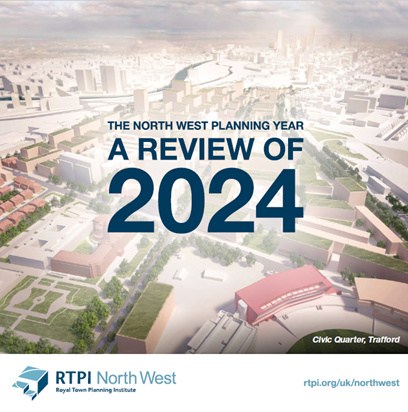 Contents
Contents
Chair's Review
Chair’s Review of the Year
Sponsors
Regional Life
RTPI North West Awards for Planning Excellence, 2024
Education, Careers and Mentoring Task Group 2024
World Town Planning Day
Congratulations to our newly elected Chartered Members!
Stanley Gilbert
RTPI NW Dinner 2024
Planner Live North 2024: ‘Collaboration, Competition, and Community’
RTPI President’s Visit 2024
Planning Aid North West in 2024
EDI Champion Update
LPA Champions
North West Young Planners 2024
Regional research and good practice
Policy and Research Task Group Report for 2024
Guest Academic Article
Cycling and the city region: policy ambitions and the realities of delivery in Greater Manchester
Looking Forward
Chair’s Review of the Year
Welcome to our 2024 Annual Review!
 I can’t believe I’m writing this with 2025 just around the corner. Which means that sadly, my role as Chair is coming to an end – time flies when you’re having fun!
I can’t believe I’m writing this with 2025 just around the corner. Which means that sadly, my role as Chair is coming to an end – time flies when you’re having fun!
Wow, what a year it’s been. A Labour Government is back in power for the first time in 14 years. And 17 Housing and Planning Ministers later (yes, I counted!), we have a new captain at the helm in Matthew Pennycook MP (who’s already outlasted some of his predecessors!). And it’s a breath of fresh air, isn’t it; to have some real optimism about the place, with some fresh new ideas (however controversial they might be to some). But let’s not dwell on the details, let’s remember where we were only a few months ago. Planning is back in the headlines; it’s frontpage news. Central to the UK’s growth ambitions. And that can only be positive for our profession. Planners deserve much more credit and recognition. Never underestimate a planner!
I might be biased but I genuinely think the North West has the most talented amazing planners in the whole country. I’ve met so many dedicated, tenacious and hard-working individuals in my role. I’ve been blown away. Especially by the enthusiasm and passion of our early career professionals. It’s been a privilege to be your Chair. We’re a decent, friendly bunch ‘up north’, aren’t we?
Some of my highlights this year have included:
- Attending three book launches at the Universities of Liverpool and Manchester (shout out to Olivier Sykes, Ian Mell and Bob Phillips!).
- Giving Lindsey Richards (President) a tour of the region and hosting our inaugural Members’ Celebration event (more on that later).
- Flying the flag for planning (and getting soaked) at UKREiiF in Leeds.
- Sharing the stage with Adam Henson (BBC Countryfile) at the Annual Dinner (yes – slight man crush!).
- Visiting Lancaster City Council to see what they’ve been up to, including some exciting projects underway (not least Eden Project Morecambe).
- Attending a private roundtable with Matthew Pennycook MP at the Labour Party Conference (he knows his stuff!).
- Meeting Liverpool City Council with Victoria Hills (Chief Executive) to hear how their planners have been excelling in the face of adversity.
- Losing in style at the RTPI NW Pub Quiz.
- And as I write this, looking forward to our AGM at Chester Zoo.
But these are just the highlights! I haven’t even mentioned our bumper CPD programme, Young Planners events, regional awards, response to the NPPF consultation, talks to students and social activities, and much more (although I guess I just did!).
All of which has been delivered by our fantastic volunteers alongside the legendary Bev. That’s an important point, because I think a lot of people forget, or perhaps don’t realise, that the RTPI is supported by unpaid volunteers (like myself) who give up their time for the benefit of you, our members. So thanks to every one of you.
And thanks also to our generous sponsors, who have made things happen. And of course, a big ‘thank you’ to my employer Richborough, who have been extremely supportive of my volunteering this year – they’ve never said ‘no’ to anything the RTPI have thrown at me. They even dug deep into their pockets to be headline sponsors at the Annual Dinner. I hope you enjoyed your complimentary welcome drinks (see, it pays off to arrive early)!
All this makes me feel immensely proud. I honestly think we’ve had a good go at our top three priorities for 2024: supporting the public sector, recruitment and retention and collaboration.
But the hard work doesn’t stop there. 2025 will bring about further changes and challenges, I’m sure. Not least a new plan-making system, the re-introduction of strategic planning, and increased devolution. Exciting stuff. What a time to be a planner!
So I think it’s apt to be passing the medal onto our new Chair Ben Vickers (and our first public sector Chair since 2015!). He is a great advocate of planning and will fight your corner. I’m certainly leaving you in good hands. Let’s wish Ben the best of luck.
Matt Dugdale
RTPI NW Chair 2024
[email protected]
Sponsors
Thanks to our 2024 Sponsors and Hosts:
David Wilson Homes, Kings Chambers, CMS, Richborough, PlacesMatter, Curtins, Kings Chambers, Stonebond, e*SCAPE Rural, Lichfields, Lambert Smith Hampton, Urban Imprint, Hive Land & Planning, Cassidy + Ashton, Stonebond
In kind
Eversheds-Sutherland, Shoosmiths, University of Liverpool, University of Manchester, WSP, Stantec, Arup
Regional Life
In this section we look at what the North West Region, its planners and volunteers, have achieved in developing and rewarding, best practice in 2024
RTPI North West Awards for Planning Excellence, 2024
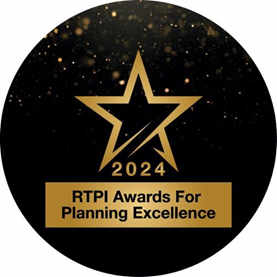 It has been another busy year for our prestigious Regional Awards with a total of 25 entries received across a range of categories. Due to the high standard of entries, 23 entries were shortlisted for site visits, presentations and interviews across the following categories:
It has been another busy year for our prestigious Regional Awards with a total of 25 entries received across a range of categories. Due to the high standard of entries, 23 entries were shortlisted for site visits, presentations and interviews across the following categories:
- Excellence in Plan Making Practice
- Excellence in Planning for a Successful Economy
- Excellence in Planning for Heritage and Culture
- Excellence in Planning for the Natural Environment
- Excellence in Planning for Communities (small and large schemes)
- Planning Authority of the Year
- Small Planning Consultancy of the Year
- Young Planner of the Year
The judges had two full days of site visits on the minibus, travelling to Stockport, Preston, Manchester, Newton le Willows and Birkenhead. Online interviews also took place over two days following which the judges met several times to debate and decide winners and commendations.
Young Planner of the Year was the most hotly contested category this year, having received five excellent entries from some of the very best within our region and the judges were impressed by them all.
Our amazing judging panel included representatives from across the public and private sectors, who bring varying experiences to the judging process:
- Jake Crompton – Awards Task Group Leader – Stonebond
- Adam Buxton – Awards Sponsor – Lambert Smith Hampton
- Chris Findley – Retired from Salford City Council
- Holly Froggatt – Homes England
- Jade Corcoran – Salford City Council
- Jo Gregory – Urban Imprint
- Joanne Harding – Home Builders Federation
- John Copestake – Freelance Chartered Town Planner
- Lesley Buchanan – University of Salford
- Natalie Leung – Arup
- Nia Borsey – Fisher German
Entries to the RTPI North West Awards for Planning Excellence 2025 open in January 2025 and we encourage you to consider submitting an entry for schemes that meet the criteria (please liaise with Bev in the first instance if you’re unsure or need some advice.
The Winners
The winners were announced at our Annual Dinner on 27 June (at the Kimpton Clocktower Hotel, Manchester), and kindly sponsored by Lambert Smith Hampton.
Excellence in Plan Making Practice
WINNER
Civic Quarter Area Action Plan (submitted by Trafford Council)
Trafford’s Civic Quarter Area Action Plan delivers a new 4000 home sustainable neighbourhood through ambitious policies for net zero, public realm, greenspace and housing quality. Developed with partners and the community to take advantage of a unique set of assets and new development opportunities and challenges, the CQAAP is a Development Management led plan. It is a vehicle for transformational change and regeneration, bringing forward new high density development and associated infrastructure through an innovative equalisation strategy. Plan production has given opportunities for planners to learn new skills and broaden their experience whilst directing Council resources wisely.

Trafford Civic Quarter Masterplan
"As the Plan Making in category winner the Judges considered that the Civic Quarter Area Action Plan (AAP) demonstrates excellent practice in the plan making and is a statutory policy framework designed to ensure that the revitalisation of the Civic Quarter is managed and delivered effectively.
"The AAP stands as a testament to innovative and collaborative plan-making practice, balancing growth, sustainability, and community needs and is deserving of this award. It seeks to sustainably address the challenges faced within this fragmented area and has evolved through the Council’s efforts to collaborate with all stakeholders and ensure that its aims fully maximise the neighbourhood's opportunities.
"The AAP provides an innovative approach, balancing development with sustainability and community well-being, and underscores the significant efforts Trafford Council have made in plan-making to make a real difference to the area.
"The judges considered that the AAP is also a good example of the use of policy to follow zero carbon plans, promote sustainable travel, and incorporate sustainable design, ensuring that climate resilience is integral to new development.
"Overall, the Civic Quarter Area Action Plan is this year’s worthy winner of the Excellence in Plan Making Practice - North West."
Excellence in Planning for a Successful Economy
WINNER
Stockport Interchange (submitted by Stockport Council & Transport for Greater Manchester)
Stockport has big ambitions. This shows they can be delivered. A modern transport hub, new park, new homes, new active travel links across the town have begun the transformation.
The partners – public and private – have worked together to ensure the deliver outstrips the vision The interchange – integral to the Bee Network – demonstrates GM’s vision for a London-Style transport system.
The park is unique in the UK and provides a green space for all in the borough to enjoy and sustainability is in the DNA is helping make Stockport the best place to live and work.
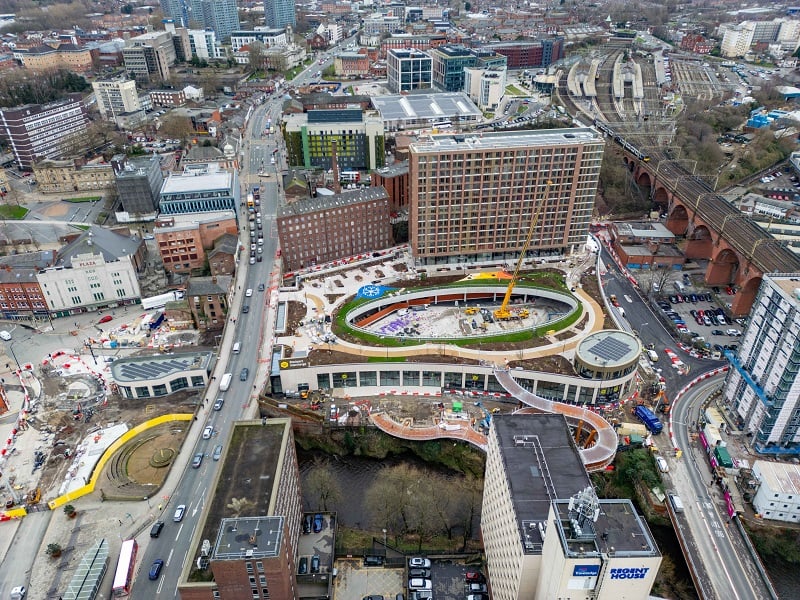
Stockport Interchange
“The judges were impressed with the living accommodation. The current scheme includes a residential block of 196 apartments of good quality, with direct access to Viaduct Park and its facilities and well connected to the town and its transport infrastructure. It provides an exemplar setting a suitably high bar for the type and quality of development that the council and its partners want to see in this part of Stockport Town Centre.
"The team should be very proud of their achievements.”
Stockport Interchange was also awarded the Excellence in Planning for a Successful Economy and Silver Jubilee Cup at the National RTPI Awards for Planning Excellence 2024.
Excellence in Planning for Heritage and Culture
WINNER
Aviva Studios (submitted by Deloitte)
Aviva Studios, the home of Factory International, is a landmark new cultural space for Manchester and the world. Built with flexibility in mind, the design of the building is led by Ellen van Loon of the world-leading practice Office for Metropolitan Architecture (OMA). Leveraging the site’s past as ITV Granada Studios and Manchester’s buzzing cultural scene, Aviva Studios boasts 13,250 square metres of ultra-flexible space that allows artists to make ambitious, never-seen-before work on a huge scale. Deloitte led the planning process throughout, including stakeholder engagement and onwards to practical completion.
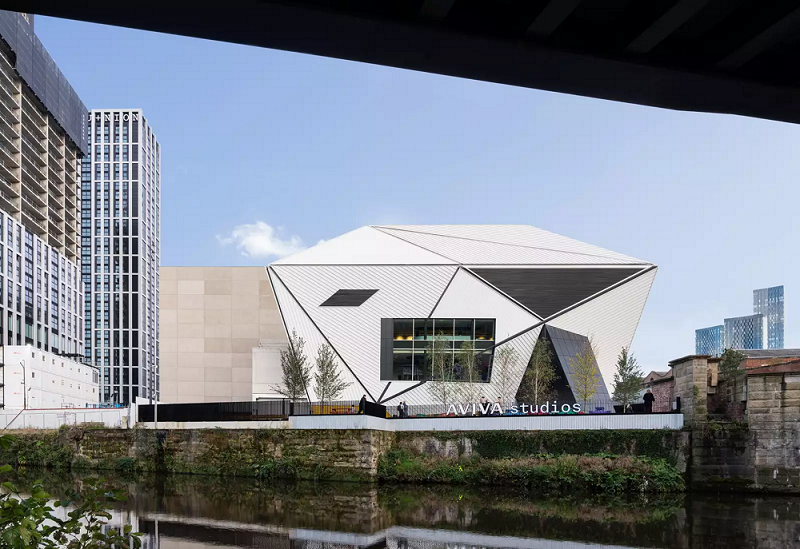
The Aviva Studios
“Aviva Studios is a very diverse project which has strong outcomes for people and communities, located within the heart of Manchester. It is clear the focus of the building is around local people and provides a clear connection of the culture of the area and respects to the heritage within its location.
"Public realm has been a key player in developing this area, and has focussed on creating a social space, whilst creating a crucial link, aiding permeability and connectivity between Manchester and Salford over the River Irwell.
"Accessibility and diversity are key themes felt within this space and breaks down barriers for all. The building goes far beyond its architectural merit, it’s the innovative utilisation of space which creates important values for people.
"The building and outside space has created a catalyst for regeneration within this area, the site visit highlighted a clear vision for this building and the intentions for this space from the very start. The goal has been clear from conception to completion.”
Excellence in Planning for the Natural Environment
WINNER & BEST IN REGION
West Cumbria Pipeline (submitted by Lake District NPA / United Utilities)
A multi-disciplinary, multi-agency, cross boundary infrastructure project to supply water to 80,000 homes and businesses in West Cumbria, delivered with a planning performance agreement at its heart, which brought together the applicant (United Utilities), three local planning authorities (Lake District National Park Authority, Allerdale Borough Council and Copeland Borough Council) and a wide range of expert advisers including Natural England, the Environment Agency and highways and lead local flood authority teams at Cumbria County Council. As well as being an exemplar of planning delivery the project had multiple direct and indirect benefits for the natural environment and water resource management.
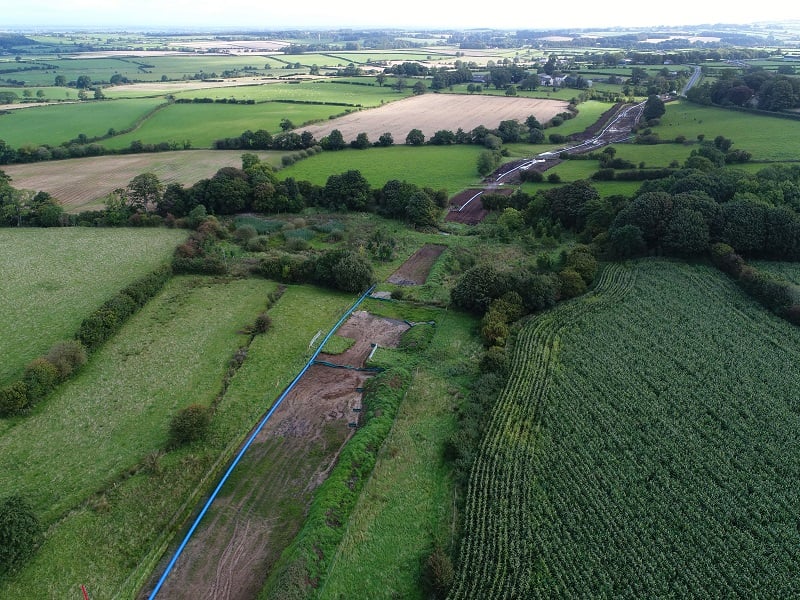
West Cumbria Pipeline Route
“The planning, implementation, and delivery of the West Cumbria Pipeline, by the Lake District NPA and United Utilities was unanimously agreed by the judges to be a complex, challenging, and exceptional exemplar of a planning led infrastructure development scheme for the Northwest region.
"The judges were particularly impressed by the impact of the installation of the pipeline and how this would achieve the provision of a long-term sustainable water supply to the local population of 80,000 homes and businesses, whilst ensuring future preservation of a Special Area of Conservation and Site of Special Scientific Interest, thus avoiding harm to protected species and habitats.
"The panel were inspired by the chosen approach, with an experienced planning practitioner, taking a central role at the “heart of the process”, duly ensuring that any barriers and challenges, were identified, appraised, and resolved at an early stage, when combined with effective leadership and a robust strategic vision, facilitated three major planning applications being approved, in a timely and proficient manner.
"An additional achievement was the positive, proactive collaboration and engagement between the partners, in addition to a diverse, array of key stakeholders and interested parties, demonstrated by the development of a £600,000 legacy fund aimed at local groups and persons, impacted by the project.
"Sustainable infrastructure development is fundamental to the future attainment of net- zero and energy efficiency targets and the scheme provides 80kW of renewable hydroelectricity, sufficient to meet 40% of the site’s needs or equivalent of 175 homes and further climate adaptation measures.”
Overall, Lake District NPA and United Utilities, by proactive planning, implementation, and delivery of the West Cumbria Pipeline, are worthy winners of this Award and the whole team are to be congratulated.
Excellence in Planning for Communities
WINNER
Cottam Hall (submitted by Homes England)
The Cottam Hall project is a true testament to Homes England’s ability to create thriving, high quality communities through achieving a long-term vision, with collaboration and commitment throughout. The continued role of Homes England in the project from the extensive pre-application community and stakeholder engagement process, to securing outline planning permission, to the considered phased disposal has resulted in a highly desirable and sustainable place to live.
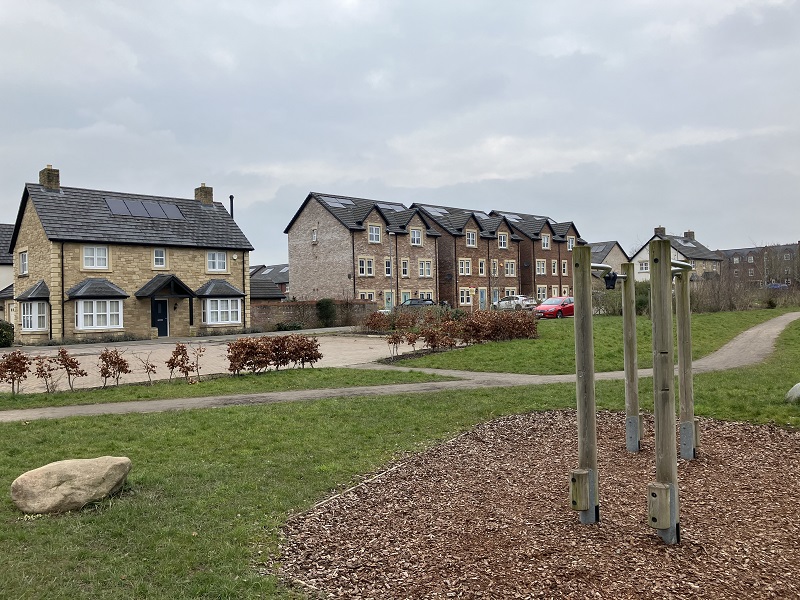
Cottam Hall Homes
“The judges were impressed with Homes England’s vision for Cottam Hall and their commitment to quality placemaking and sustainable development. From the outset Homes England set the tone through master planning, key development parameters, and a clear bidding process with value being placed on the integration of high quality residential development with open space and nature. The masterplan sought to provide a safe and secure environment, small-scale commercial activities, and improved neighbourhood connectivity to truly facilitate sustainable development.
"Homes England undertook extensive community and stakeholder engagement, which influenced the development of the masterplan, vision for the area, the proposed urban design and development principles. Clear and positive engagement fostered good relationships with both key local representatives and the community.
"It is clear that the redevelopment of Cottam Hall has been designed with community at its heart. The latest phase of the development provides a significant number of high quality energy efficient homes varying in size, type and tenure (including 30% affordable housing addressing an existing shortfall in Preston) while integrating with local identity and set within a charming landscape. This landscaped environment provides opportunities for community interaction, leisure, recreation, education, and biodiversity enhancement.
"In summary, this development is of a high quality delivering an integrated neighbourhood that meets local needs with access to infrastructure and facilities for the emerging community, a scheme of excellence in Planning for Communities.”
Planning Authority of the Year
WINNER
Lake District National Park Authority
The Lake District National Park Authority's high performing team planning team, driven by the vision “an inspirational example of sustainable development in action” work to balance the conservation of the park's natural beauty, wildlife and cultural heritage with the needs of the local communities. The small, close-knit team’s achievements include creating an award-winning Local Plan which has provided a policy framework to make high quality, timely decisions on 2,000 pieces of planning casework each year. New recruitment pathways, flexible working practices, creating career progression opportunities, and a monthly in-house training programme are fostering a more inclusive and diverse team.
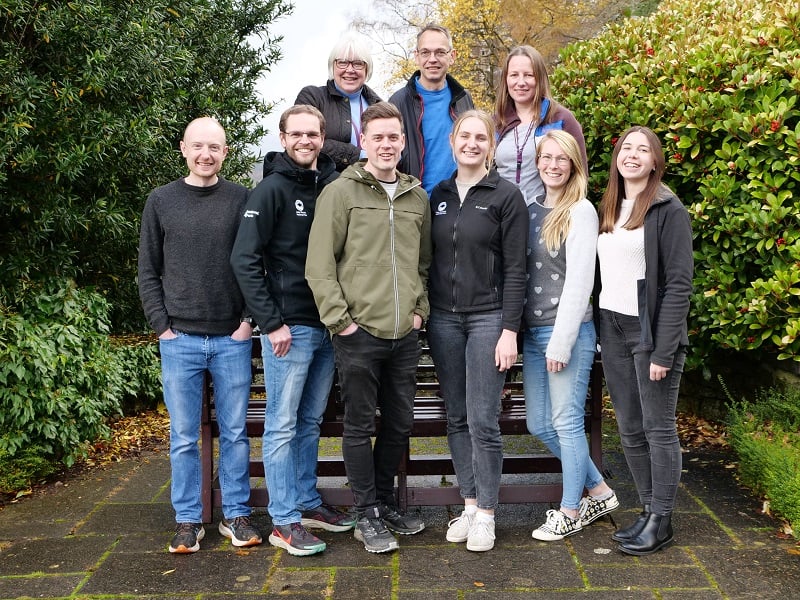
Lake District National Park Authority Planning Team
“The Judges recognise the challenges previously faced by the Authority. The submission highlights the steps and techniques implemented by the Authority to resolve these issues as well as the Authority’s resilience and dedication to significantly improving performance metrics. Through doing so the Authority has successfully improved its timely determination of planning applications and has implemented robust enforcement processes resulting in the Authority becoming one of the most active enforcement authorities in the country.
"The dedication to professional growth is evident through structured career progression opportunities. The Authority’s inclusive recruitment pathways attract talent from various backgrounds, including students, graduates, and professionals from other fields.
"Given its vital role in managing planning functions within the Lake District National Park and the English Lake District World Heritage Site the team excels in leadership across a wide variety of projects, including in nutrient neutrality across Cumbria, the Windermere Gateway development project, and the west coast water pipeline project. Along with their involvement in the Design Code Pathfinder Project and evolution of the Lake District Design Code. The judges considered that the submission demonstrates the Authority’s commitment to planning excellence.
"The Authority’s innovative approaches, professional pride, delivery of planning-outcomes, commitment to professional development and inclusivity make them deserving winners of this year’s award.”
Small Planning Consultancy of the Year
WINNER
Euan Kellie Property Solutions
Euan Kellie Property Solutions has a reputation for delivering commercially savvy outcomes across Greater Manchester. The team thinks laterally to solve complex planning problems and deliver meaningful projects.
They are passionate and driven, relish challenging briefs and always look for solutions that ease tensions. The dynamic and friendly team is well known and well respected, and clients attest to their responsive service.
With more than 100 Greater Manchester projects under their belt, they are the trusted advisors for clients including Salboy, Domis, THG, Property Alliance Group, One Heritage and Step Places, helping them to unlock planning and deliver positive change.

Euan Kellie Property Solutions Team
"Focussed on Greater Manchester the team has advised on more than 100 large schemes over the past 10 years. The team’s expertise and skill sets are greatly respected by local authority colleagues with whom they work and negotiate, and by the private sector clients who they advise. There is a culture of partnership working and problem solving which is valued by clients and local authority officers, underpinned by a sound knowledge of the planning process and understanding of the commercial realities of delivery, as well as good project management skills enabling the expert advice of other professionals to be integrated into the negotiation process.
"The team’s passion for good planning shone through in its submission, with the four strong senior team hands on in project work, helping to build mutual respect and trust through successful partnership working and solid outcomes. A commitment to staff development and business improvement lays the foundation for the consultancy moving successfully forward in its planning work over coming years."
Young Planner of the Year
WINNER
Ian Pennington (WSP)
 As Active Travel Lead in WSP’s Infrastructure Planning team and Chair of RTPI North West’s Young Planners, Ian motivates and inspires peers through professional and voluntary roles.
As Active Travel Lead in WSP’s Infrastructure Planning team and Chair of RTPI North West’s Young Planners, Ian motivates and inspires peers through professional and voluntary roles.
Ian strives for social, environmental, and economic progress through his work, evidenced by Heckmondwike Bus Station, for which he coordinated a multidisciplinary team to maximise benefits on a constrained site. Other notable projects include a DCO scheme, and planning applications for a walking, wheeling and cycling bridge, and a proposed greenways network.
Ian’s time spent volunteering is an asset to the profession, delivering a range of innovative CPD and networking events for peers.
“The judges considered that Ian’s personality and enthusiasm really shone through in his submission, and that both his professional and considerable voluntary work were of the highest calibre. Ian shows clear evidence of genuine commitment to continuing professional development and improving outcomes for planners. And his involvement with the RTPI, Young Planners, outreach work and voluntary activity is above and beyond the usual.
"Ian provides an excellent example of contributing to planning practice in the challenging area of infrastructure, demonstrating a solid understanding and experience of a range of planning policy areas. The judges considered that through both his professional and voluntary work Ian is an inspiration to the next generation of planners and a worthy winner of this category.”
Commended
Planning Authority of the Year
Warrington Council
Warrington Borough Council strives to be a place that works for all: providing opportunities for the most vulnerable; with a strong, sustainable economy that benefits everyone; with strong, active and resilient communities; and an exemplar green town. Warrington has positively planned its long term growth to ensure that new homes, jobs and businesses are supported by major improvements to the Borough’s infrastructure, to the benefit of existing and new communities alike and its position as one of the most important economic hubs in the UK is consolidated.
Commended
Excellence in Planning for Communities (Small Schemes of 50 or less homes)Redevelopment of the former Newton Community Hospital (submitted by Stantec)
The project involves the redevelopment of the Former Newton Community Hospital, Newton le Willows for Torus 62 Developments Ltd.
Stantec worked closely with Torus 62 Developments, an affordable housing provider, to secure full planning permission for new affordable houses at the site of the former Newton Community Hospital, which included the conversion of a non-designated heritage asset and the provision of a new block of high quality apartments within the Green Belt.
Commended
Small Planning Consultancy of the Year
Made it Together
The MIT team are planning experts. They offer well considered planning advice that saves clients time and unlocks opportunity. They listen, taking care to understand the needs of clients and collaborators. They put themselves in the picture to understand the dynamics and find the angles.
MIT are people focused and care about the journey and the objectives. They believe in giving back more than they take and providing opportunities for all. They believe in collaboration and doing things the right way through fostering personable and enjoyable working relationships.
Commended
Excellence in Plan Making Practice
Lake District Design Code SPD (submitted by lake District National Park Authority)
Friends of the Lake District, together with Dark Source Lighting Design and all the relevant local planning authorities, has produced the Cumbria Good Lighting TAN, covering Cumbria, the whole Yorkshire Dales National Park and both the Cumbria and Lancashire parts of the Arnside & Silverdale National Landscape. It uses tools including bespoke graphics to provide technical support to planners and applicants in applying relevant policies when submitting or assessing planning applications, enabling them to help deliver a net reduction in light pollution and, in turn, goals for climate change, the natural and built environment, health and wellbeing and the economy.
Commended
Excellence in Planning for
a Successful Economy
Building Foundations (submitted by Preston City Council)
Building Foundations is an innovative service by Preston City Council and Calico Enterprise Ltd, which work in partnership, in liaison with developers, to optimise the social value impact and size of employment, skills, training, work experience, employer engagement and apprenticeship targets within Employment and Skills Statements. Outcomes of the wraparound service are monitored to ensure delivery, harnessing construction stage social value to improve economic inclusion. This includes for young people disengaged from mainstream education, by fostering relationships with local partner contacts, including UCLan, local colleges, the Skills Construction Centre, Preston Vocational Centre and the Lancashire Skills and Employment Hub.
Commended
Young Planner of the Year
Imogen Zulver (Lichfields)
Imogen is an exemplary professional with a superb understanding of the planning system and complexities of policies and regulations. With almost 7 years’ post qualification experience, Imogen’s impressive portfolio of high profile and complex schemes is a testament to the depth of her expertise. Imogen is a dedicated individual who strives to seek out new and innovative ways to diversify work streams in the business and raise her profile within the industry. Her enthusiasm and compassion are important attributes to maintaining fruitful and mutually respectful relations with other industry professionals and making a positive impact to inspire new young planners.
“The judges were impressed by Imogen’s active career progression, involvement in Lichfield’s Expert Groups and active involvement in a range a complex project including EIA developments which in turn demonstrates a clear understanding of planning policy and the planning system within which she works.
"Her vast range of projects, involvement in knowledge sharing, and active involvement in sector related activities demonstrates that she has a range, quality, and variety of recent planning experience. It also demonstrates that Imogen is enthusiastic about her role within the sector. Given her role in high profile and complex schemes and success achieved to date Imogen clearly has good personal and team skills both internally and externally. Imogen has demonstrated a commitment to professional development and is an active role model within Lichfields through her mentoring role.”
Commended
Young Planner of the YearKieran Blaydes (Vistry Group)
Kieran is a Land and Planning Manager at Vistry Group, with over six years’ experience as a town planner and a passion for promoting the power of planning in creating sustainable communities. He worked on the 2021 Silver Jubilee Cup winning Stoneygate Regeneration Framework which explored innovative techniques to unlock brownfield land. He Chaired the 2019 Young Planners Conference before being elected Chair of the North West RTPI in 2022 and established the LPA Engage Initiative which has since been adopted in various RTPI regions to provide support for public sector planners.
“The judges were delighted to meet Kieran this year. Through his presentation and submission Kieran demonstrated his strong commitment to continuing professional development and involvement with the RTPI. Kieran is clearly an enthusiastic leader in the planning community, acting as Chair of the of the RTPI North West for 2022, coordinating events such as the Young Planners Conference in Newcastle and notably Kieran champions supporting planners working in the public sector.
"Kieran has been integral to development of the LPA Engage Initiative in the North West and launching the LPA Engage Business Plan. This initiative seeks to tailor the ways the RTPI can support public sector planners and is proven to be successful, positively influencing the wider planning sector. This is certainly a highlight of Kieran’s submission and should be commended.”
Education, Careers and Mentoring Task Group 2024
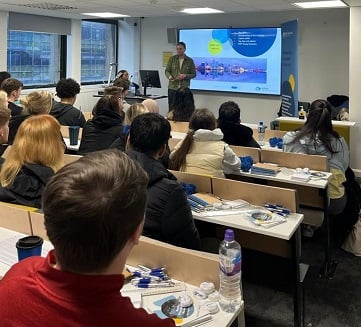 It’s been a challenging yet fulfilling year for throughout 2024, the Education, Careers, and Mentoring task group has continued to make significant progress in building and strengthening connections with educational institutions, aspiring planners, and communities across the North West. Building on the achievements of previous years, we have sharpened our focus on expanding our reach, aiming to introduce planning as a career to those who may not be familiar with it and to dispel common misconceptions about the profession.
It’s been a challenging yet fulfilling year for throughout 2024, the Education, Careers, and Mentoring task group has continued to make significant progress in building and strengthening connections with educational institutions, aspiring planners, and communities across the North West. Building on the achievements of previous years, we have sharpened our focus on expanding our reach, aiming to introduce planning as a career to those who may not be familiar with it and to dispel common misconceptions about the profession.
This year, we have actively sought new and creative ways to connect with prospective planners while maintaining engagement with our members across the region. In recent years, the task group has concentrated on establishing a strong foundation to extend its regional impact. Recognising the value of engaging with educational institutions from diverse backgrounds, we aim to introduce students at all academic levels to the RTPI and the planning field. By building collaborations with other organizations and strengthening ties with public authorities, the task group is working to develop a robust network and increase visibility for events and opportunities that benefit our members.
Although the opportunities haven’t been as forthcoming as in previous years, the task group has actively worked to sustain and build its relationships with partner organisations. We have maintained open discussions with both Combined Authorities and Lancashire County Council, exploring potential areas for future collaboration that align with our shared goals. Additionally, we have engaged with other third-party organisations, such as Regeneration Brainery, not only to collaborate on projects but also to exchange best practices and refine our approach to community and educational engagement.
These connections are essential for broadening our network and diversifying our reach, allowing us to connect with new audiences. Importantly, they also enable us to leverage our resources more effectively, extending our impact without placing a heavy demand on our volunteer members' time. By building these partnerships, we hope to create sustainable pathways for promoting planning as a career and reaching those who may not yet see it as a viable or accessible option.
Internally, the task group has also prioritised deepening its collaboration with the Young Planners network, recognising the value of joining forces to engage and inspire the next generation of planners. This year, we’ve actively supported key events, such as the Speed Networking sessions held at both accredited universities in the region, which have received enthusiastic feedback from participants. These events provide a unique opportunity for students to connect directly with experienced planners, allowing them to gain valuable insights into the profession.
Looking ahead, we are eager to partner on upcoming initiatives like Speak Easy, which as outlined below, is a program designed to foster open dialogue on current planning topics and develop members and young planners' public speaking skills. By working alongside the Young Planners network on initiatives like these, we aim to create a supportive environment that empowers aspiring planners and strengthens our profession.
Speak Easy
The Speak Easy event is proposed as a relaxed, low-pressure environment for professionals in planning to practice public speaking and presentation skills within small, supportive groups. The platform primarily caters to students and young planners but is open to anyone seeking to build confidence speaking in front of an audience. Its aim is to help participants overcome the initial hurdle of presenting in front of others by fostering a space where mistakes are acceptable.
Sessions will be held in small-to-medium meeting rooms, equipped with screens or projectors for visual aids. Group sizes will be limited to maintain an intimate atmosphere, with a maximum of ten attendees. Participants will be asked to prepare a five-minute presentation on a planning or related topic of their choice, with flexibility in format—slides, notes, or other aids are welcome. A moderator will manage the timing, ensuring presentations stay within the five-minute limit.
Feedback will be optional and offered only to those who request it when signing up. For those seeking constructive input, at least one representative from the RTPI / Regional Activities Committee with a strong background in public speaking will be present to provide support.
The task group are looking to start a series of Speak Easy events in 2025. If you are interested, please feel free to get in touch.
Embedded Career Module
For the second consecutive year, the task group was asked to support the University of Liverpool’s careers and academic team in providing an assessed module. On this occasion, the University of Liverpool and RTPI NW’s Education and Careers Task Force partnered to create a real-world project experience for students. This task required students to tackle an actual issue, demanding critical thinking and engagement with challenges currently faced in the planning profession. Designed with an embedded employability approach, students were divided into groups and assigned an inquiry-based project to explore the question: "How are the RTPI and the wider planning sector actively supporting the regeneration of town centres in the Liverpool City Region?"
Each group focused on one of three specific locations and utilised resources from public, private, and professional sources, such as the Liverpool City Region Combined Authority’s Spatial Development Strategy and insights from the RTPI High Street Taskforce. The project culminated in the creation and presentation of a “digital story”—a group presentation using digital media and techniques to enhance their oral communication.
This initiative aimed to achieve three key objectives: (1) to increase student awareness of the RTPI and its contributions to the field, (2) to deepen students’ understanding of the diverse roles within the planning profession, and (3) to provide students with a valuable, hands-on experience that helps them develop transferable, employable skills.
The module has been very well received and, in the early part of the year, received a visit from Lindsey Richards, President of the RTPI, who had the following to say about the initiative:
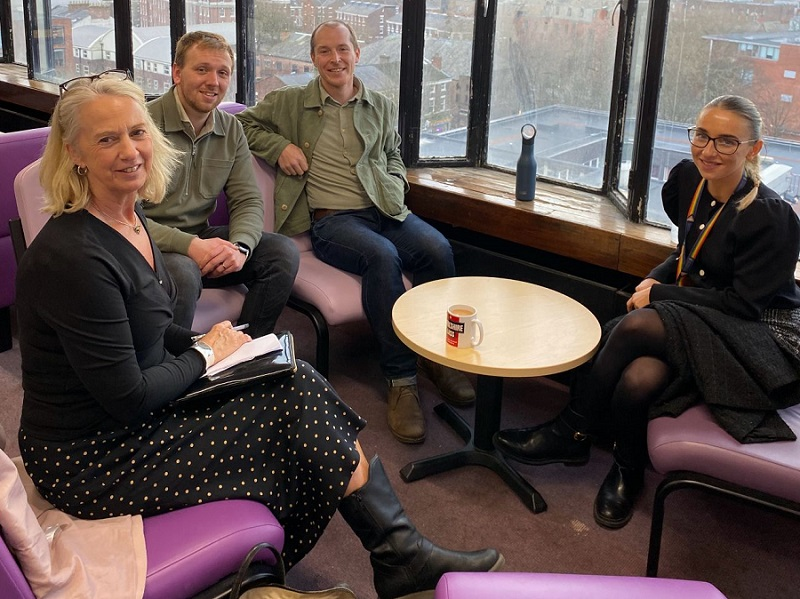
Lindsey Richards, President of the RTPI at the University of Liverpool
Once again, this project has been really well received by the academic team at the University of Liverpool and the students involved. The task group identify this as a key collaboration between the two organisations and we are already working on supporting the school with the same module this year.
‘Coffee with a Planner’
Further to last year’s success, the task group has looked to continue to develop the ‘Coffee with a Planner’ initiative. This project looks to provide opportunities for students, as well as those who are seeking a change in career, to have informal mentoring with practising planners in the North West. The conversation can be on anything, but is anticipated to centre around: career advice, feedback on CVs or more about what planners do in their day-to-day roles. The task group have sought to match planners who were working in fields that those who have applied were interested in, for example, urban design or strategic planning. Both the students and the planners who have previously volunteered have found the experience overwhelmingly positive.
Within the next twelve months the task group will be looking to diversify our strategy and the way in which we promote this project. The aim of this will be to try and engage with more professionals that are looking for a change in career, as well as becoming more apparent within the Universities. This is so that we can take a more proactive approach in targeting new students entering their studies, in the hope of seeing more engage with the programme and the RTPI more widely. A new marketing strategy has already been developed and new leaflets will be released soon to support the initiative.
Could you be an Ambassador?
 The RTPI’s Corporate Strategy program, BALANCE (Build A Legacy And New Community Equality), is an educational initiative aimed at engaging schools in areas of high planning demand and socio-economic need. Its goal is to attract diverse, talented young people to the planning profession by highlighting accessible career pathways. RTPI Ambassadors — volunteer members — play a key role by promoting planning as a career through school visits, university fairs, and work experience opportunities. Ambassadors receive support and materials to help them effectively engage underrepresented groups and may log their volunteer work as part of their professional development. Members interested in becoming Ambassadors are encouraged to register their outreach activities and review RTPI guidance.
The RTPI’s Corporate Strategy program, BALANCE (Build A Legacy And New Community Equality), is an educational initiative aimed at engaging schools in areas of high planning demand and socio-economic need. Its goal is to attract diverse, talented young people to the planning profession by highlighting accessible career pathways. RTPI Ambassadors — volunteer members — play a key role by promoting planning as a career through school visits, university fairs, and work experience opportunities. Ambassadors receive support and materials to help them effectively engage underrepresented groups and may log their volunteer work as part of their professional development. Members interested in becoming Ambassadors are encouraged to register their outreach activities and review RTPI guidance.
As previously mentioned, the task group is aspiring to extend its reach across the region. As a consequence, and in order to support this, we are looking for RTPI members to volunteer themselves and become an ambassador. As part of the institution’s Future Planners initiative, Ambassadors will be asked to attend educational events, such as careers fairs, to work alongside teaching staff and promote the profession of planning. If you would like to represent the RTPI and are comfortable talking about your career in planning, then please get in touch ([email protected]). These roles can be extremely rewarding and offer you the opportunity to provide an insight into your day to day job to students who may not have even considered or heard of planning before.
Acknowledgements
The task group would like to use this opportunity to extend our thanks to the volunteers that have supported the task-group during the last twelve months; attending careers events and presenting at various schools throughout the region. It is also great to acknowledge and thank the judges of the Moss Madden Awards: Georgina Blackburn, Chris Wilson and Ben Vickers for their continued support and willingness to be involved in the awards.
Do you want to influence the built environment?
Information on your possible career in planning is just one click away.
Urmston Grammar School Careers Cafe: Urban Planning
As part of World Town Planning Day activities, in 2024, Urmston Grammer School welcomed Senior Planning Officer (Urban Design) at Rochdale Borough Council, Michael Atkinson-Smith and Associate Director, WSP Matt Hard, to deliver an inspirational and informative presentation on careers in urban and town planning for students from a variety of year groups who aspire to work in this sector, and who are interested in finding out more.
The presentation began with a fascinating map of last century Trafford, pre-planning and development:
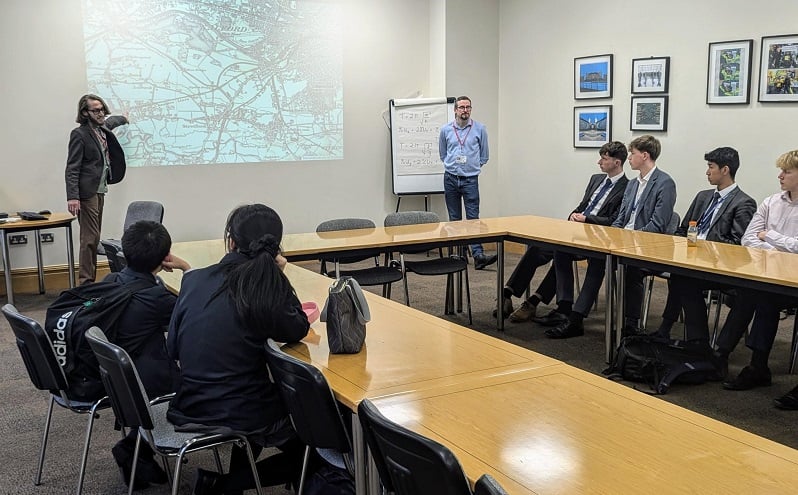
Urmston Grammar School Careers Café Student Meeting
Students were then guided through what a town planner does and their role in helping communities, companies, and politicians decide on the best way to use land and buildings. This includes their vital contributions to: a sustainable future; housing quality; community access to green spaces, to jobs and to public infrastructure; their role in the fight against climate change, and in the economic prosperity and success of local communities and businesses.
The students were also able to see the practical implementation of these roles and strategic planning in case study examples. Michael and Matt then went on to illustrate the many and varied roles and facets of urban planning, including development management; planning policy; enforcement; conservation and heritage; urban design; technical support and digital transformation; GIS; regeneration; place management; ecology and environment; highways and infrastructure; legal and governance; and consultancy.
World Town Planning Day
RAC member Jake Crompton visited the School Council at Saughall All Saints Primary School in Chester on World Town Planning Day to discuss the profession, and the positive change planning can deliver. The students were engaging, and the school took receipt of the Agent Plan It workbooks for year 5/6 as well as some RTPI goodies - including stress balls and scale rulers (a must have for any planner). The School Council will be reporting back to the rest of the school in a future assembly.

Congratulations to our newly elected Chartered Members!
Overall, the North West Region has 2,482 planners, of which some 56 percent (1,392) are Chartered, 277 are retired and 423 are student members.
Aaron Jackson
Alexandra Edwardson
Benedict Sacarello
Benjamin Brumby
Charlotte Lau
Chun Fund Lai
Connor Burns
Daniel Levy
David Anderson
Eleanor Cannon
Emily Bates
Emily Sykes
Florence Hewett
George England
Harry Gledhill
Hope Bleasdale
Jack Woodford
James Whitehead
Jonathan Mumby
Joshua Fiteni
Larna Smith
Lewis Baldwin
Lucy Kinrade
Luke Roling
Madeleine McCoy
Maisie Boyes
Mandy Poon
Megan Beattie
Molly O'Sullivan
Nathan Bowater
Neil Iredale
Niamh Lyon
Omar Opoku-Addo
Rebecca Murunga
Robert Armatage
Rory Brown
Rowan Kinnaird
Ryan Macindoe
Sarah Waddington
Scott Reynolds
Sean Moulton
Thomas Jackson
Victoria Richardson
William Groarke
Stanley Gilbert
On behalf of the region we would also like to welcome Stanley Gilbert to the world, born on 18th March to RAC member and proud new father Ian Gilbert.


RTPI NW Dinner 2024
This year’s glittering Annual Dinner took place at the height of summer in the stunning Grade II* listed Kimpton Clocktower Hotel, which the official listing describes as ‘a very conspicuous landmark, and probably the apogee of "Manchester style" late C19 commercial architecture’.
Notwithstanding the heritage significance of the venue, RTPI President Lindsey Richards focused on the theme of ‘Planning for the Future’, whilst our Regional Co-ordinator Bev Watson was celebrated and recognised for her ongoing outstanding work and dedication to our members.
Our Chair, Matt Dugdale, did a fantastic job of highlighting and celebrating the work of the RTPI in the region and the now legendary MC Bob Phillips of MUDLAB aptly demonstrated that if all else fails, he has a role in the wedding or film awards industries!
Furthermore the keynote guest speaker, Countryfile’s Adam Henson, delivered a brilliant insight into rural affairs and his career in television whilst simultaneously entertaining the 350+ guests.
During the event, the North West Awards for Planning Excellence were presented with great aplomb to a rapturous audience. Once again, our congratulations are extended to all winners and commendations!
The night also saw the crowning of the RTPI NW’s Young Planner of the Year, Ian Pennington. Ian is a particularly active member of the North West Young Planners and we couldn’t be more proud of his achievements!
In other news, Julia Hatmaker (Editor of Place North West) took a seat at the top table which only goes to highlight the importance of town planners within the wider built and natural environment sector.
All in all, it was another fantastic evening for meeting friends and colleagues old and new and a true demonstration of the power of planning!
We would like to thank all of our sponsors without whom we would not be able to provide such an amazing social event, so huge thanks to: Richborough, CMS, PlacesMatter, Kings Chambers, Curtins, Stonebond and e*SCAPE Rural.
And finally, a massive thank you to everyone who dusted down their tuxedos and cocktail dresses and turned out for our flagship event. We hope that everyone enjoyed themselves and we look forward to seeing you all again in 2025.
Take a look at all the photos from the evening.
Planner Live North 2024: ‘Collaboration, Competition, and Community’
On 19th March, over 100 planning professionals gathered at Hotel Football in Old Trafford for Planner Live North, now in its fourth year. This year’s conference focused on the evolving role of planners in shaping the future of the North of England, with a particular emphasis on strategic planning, collaboration, competition, and community engagement.
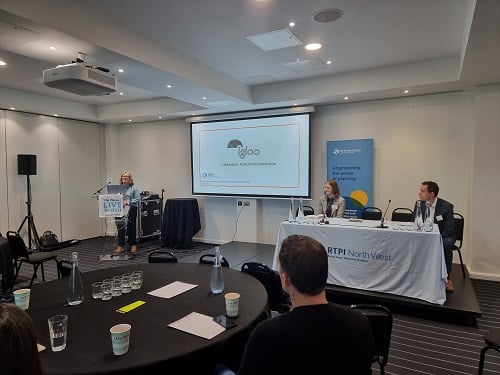
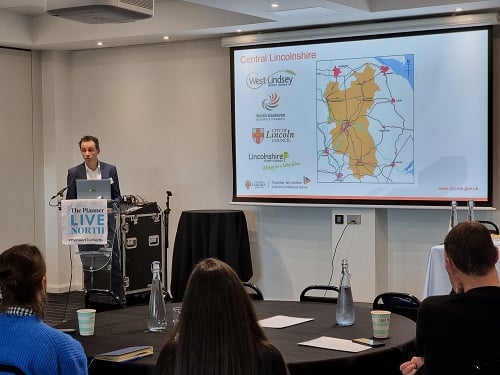
The event kicked off with Jane Healey-Brown providing an insightful overview of strategic planning and the recently adopted Places for Everyone document. Jane highlighted the vital role planners play in creating competitive, dynamic, inclusive, and sustainable towns, cities, and regions, sharing both the challenges and successes encountered along the way.
Next, a panel discussion featuring Lindsay Whitley, Chris Myers, and James Beynon explored how planners are harnessing collaboration and competition to deliver development projects while engaging with local communities.
After a short break, delegates split into a series of breakout sessions focused on the key themes of the day: collaboration, competition, and community engagement. In the collaboration sessions, Sam Veal delved into public-private partnerships, while Toby Forbes Turner discussed the benefits and challenges of preparing a joint Local Plan. Meanwhile, the competition sessions saw Claire Linley and Holly Froggatt explore topics around development delivery, including bids, tenders, and funding opportunities. The community engagement sessions, led by Darren Muir and Sam Hayes, showcased good practice and real-life case studies that demonstrate how to overcome challenges and achieve meaningful community involvement.
A highlight of the day was the opportunity for delegates to contribute to the RTPI’s research project on new strategic planning models. The project team engaged the audience by creating a word cloud of priorities based on delegates’ three-word summaries, sparking further discussion and input.
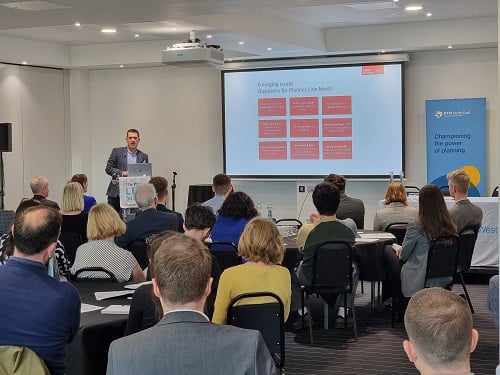
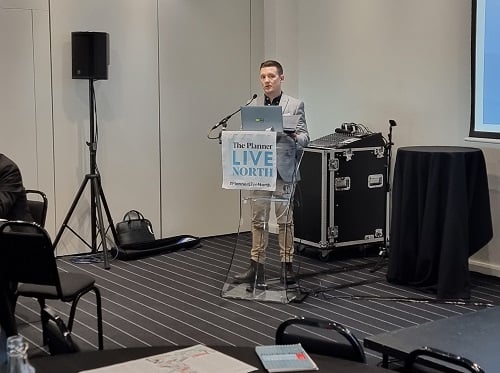
In the afternoon, participants joined additional breakout sessions that focused on taking a strategic approach to development and environmental sustainability. Alex Maynard and Sam Rosillo presented practical examples of how a strategic approach can deliver maximum benefits from development, while Matt Kirby and Nina Pindham discussed how wider, cross-boundary strategies can support biodiversity net gains, better coastal management, and stronger environmental protections.
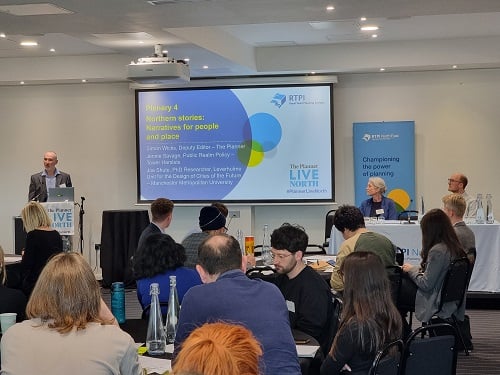
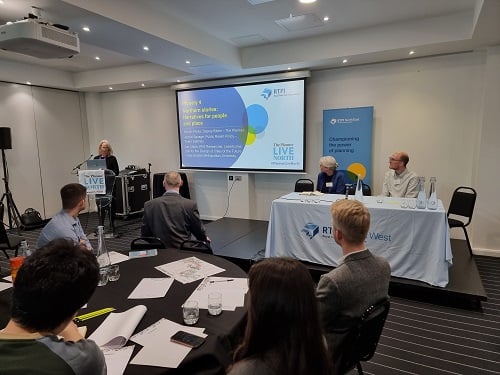
The day concluded with an engaging session from Simon Wicks, who explored the power of storytelling in public engagement and its potential to involve the wider community in planning decisions. He was joined by Jennie Savage and Joe Shute, who facilitated interactive activities that encouraged delegates to reflect on the kinds of developments they would like to see in their local areas.
Planner Live North 2024 was kindly sponsored by Atkins Realis and Quod.
RTPI President’s Visit 2024
The North West was honoured to host Lindsey Richards on her first Presidential Visit of 2024 (which was extra special for Lindsey who grew up locally). Matt Dugdale (Chair) explains what they got up to.
This year’s theme was planning in an urban context, following visits to more rural parts of the region in previous years (including the Isle of Man in 2023). So a trip to Manchester and Liverpool was in store, on what turned out to be two of the hottest days of the year.
Thursday 9 May 2024 – Manchester
After a warm welcome at Piccadilly Station, Bev and Matt accompanied Lindsey to RHS Garden Bridgewater in Salford (joint ‘Best in Region’ and winner of the ‘Heritage & Culture’ category at the 2022 North West Awards for Planning Excellence and finalist at the national awards). Escorted around the beautiful grounds by John Pye (RHS) and Vincent Ryan (Stantec), we saw how the former Worsley New Hall estate had been sensitively repurposed and were impressed by how well-established the new planting had become. On the deck overlooking the lake, enjoying a brew in the sunshine, we heard how visitor numbers had far exceeded expectations and were excited by their future expansion plans. What a fantastic asset to our region this attraction really is. I urge you to visit if you haven’t already done so.
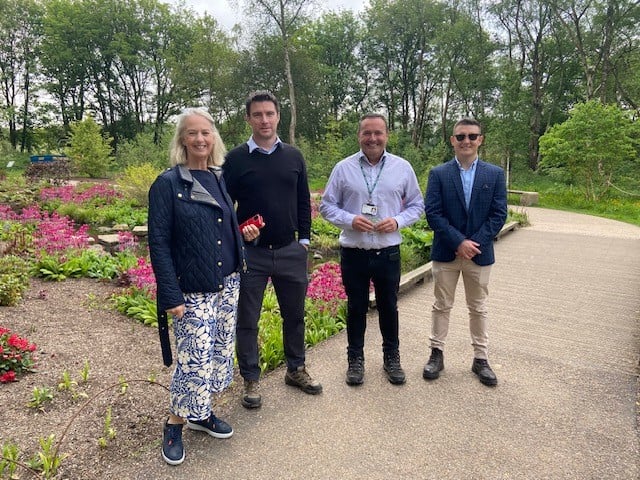
Lindsey Richards, John Pye (RHS), Vincent Ryan (Stantec) and Matt Dugdale at RHS Garden Bridgewater
 We could have probably stayed in the sun all day but we had a packed itinerary and so it was back into the city centre. Just in time to enjoy a networking lunch at the University of Manchester. We were privileged to be joined at the Humanities Bridgeford Street Building by Nick Green, Sahil Gandhi, Felix Agyemang, Vaidehi Tandel, Anna Gilchrist, Ian Mell, Cecilia Wong, Bertie Dockerill, Amy Zhang, Ransford Acheampong, and Wei Zheng who shared what their students had been up to.
We could have probably stayed in the sun all day but we had a packed itinerary and so it was back into the city centre. Just in time to enjoy a networking lunch at the University of Manchester. We were privileged to be joined at the Humanities Bridgeford Street Building by Nick Green, Sahil Gandhi, Felix Agyemang, Vaidehi Tandel, Anna Gilchrist, Ian Mell, Cecilia Wong, Bertie Dockerill, Amy Zhang, Ransford Acheampong, and Wei Zheng who shared what their students had been up to.
We then travelled the short distance to Mayfield Park (winner of the prestigious RTPI Silver Jubilee Cup and ‘Natural Environment’ category at the 2023 national awards and the ‘Health & Wellbeing’ and ‘Natural Environment’ categories at the 2023 regional awards). We were greeted by Mikey Percival (Deloitte) and Dave Barlow (Manchester City Council) and a well-timed ice cream! We saw how a neglected, dirty brownfield site had been transformed into Manchester’s first public park in over 100 years. It’s an urban oasis and well worth the short walk from Piccadilly.

Lindsey Richards, Mikey Percival (Deloitte), Dave Barlow (Manchester City Council) Matt Dugdale at Mayfield Park
We then capped off the day with the inaugural Members Celebration Event at Manahatta Deansgate. This was a new RTPI initiative where (over food and drinks) we celebrated our newly chartered members, those celebrating 50+ years of membership, and our women of influence. We also thanked our ambassadors, awards judges, LPA Champions, young planners, planning schools, fellows, and volunteers on our Regional Activities Committee and Regional Management Board. The event was a great success, attended by over 50 people despite some rather inconvenient Northern Rail strikes!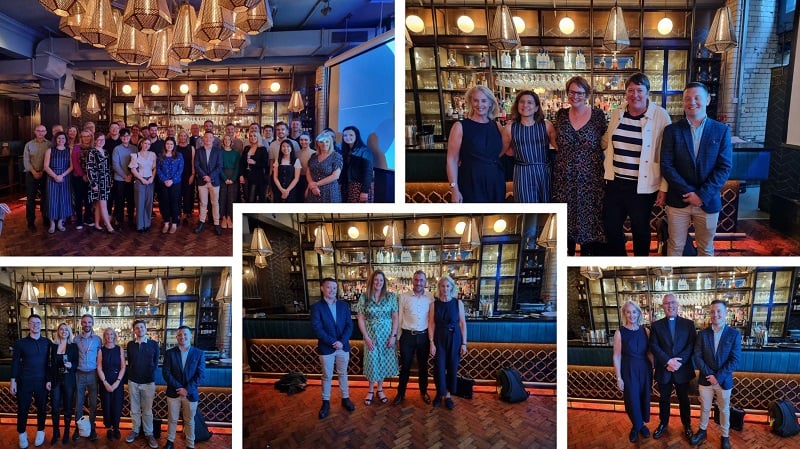
Members celebration event collage
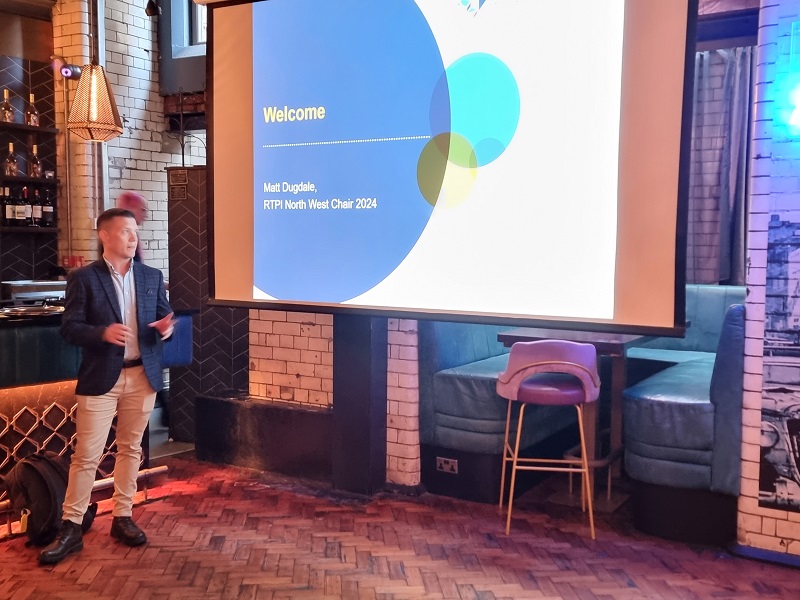
Members celebration event welcome presentation
Friday 10 May 2024 – Liverpool
The next morning, we were up bright and early to catch the Transpennine Express from Victoria Station to Liverpool Lime Street.
We travelled down to Mann Island to meet an ensemble of talented Liverpool City Region planners from the Combined Authority and city region districts. We received presentations on the pioneering Spatial Development Strategy and the new Mersey Tidal Power project (apparently the world’s largest tidal scheme!). Over a well-attended networking lunch, we listened to some of the challenges facing planners on Merseyside and explored how the RTPI might be able to help.
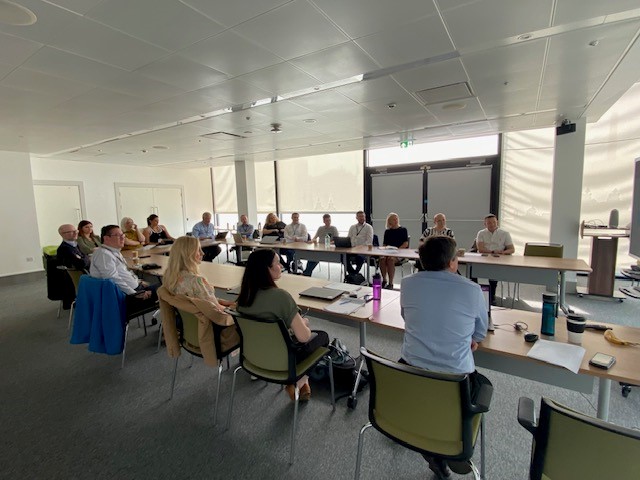
Liverpool City Region presentation
Time quickly ran away from us, and we had to dash to the Pier Head where we boarded the famous Mersey Ferry Cruise. Serenaded by Gerry and the Pacemakers we took in views of the spectacular waterfront and city skyline from across the Mersey. Peter Jones and Lesley Woodbridge (Liverpool City Council), Sean Joughin (LCRCA) and Warren Marshall (Peel Ports) were on hand to point out key heritage assets and landmarks (including the ‘Three Graces’) and brief us on ongoing and future planned developments (including Peel Ports, Liverpool/Wirral Waters and the impressive new Everton FC stadium). I hadn’t taken this trip for many years, and it was incredible to see such change.
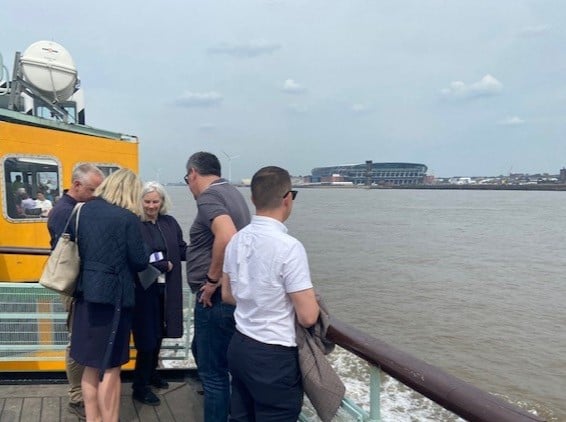
Lindsey Richards and others on Mersey Ferry
Back on dry land, we crossed the Strand and met Darren Muir (Pegasus), Diane Ellis (Legacie Developments), Mark Graham (LDA Design) and Matthew Ashton (MGMA Architects) for a walking tour around the Baltic Triangle (winner of the ‘Plan Making’ category at the 2021 regional awards and 2022 finalist at the national awards). Pausing for a well-earned cold refreshment at the Botanical Garden we met Lynn Haim (Baltic Creative CIC) at the Creative Campus and concluded by visiting the Baltic Village and BOXPARK. We were blown away by the success of a group of very dedicated individuals and organisations working in partnership to bring a previously unloved part of the city centre back to life. We heard how a vibrant urban community had been re-established by repurposing derelict buildings, attracting new investment, increasing footfall and generating interest with active ground floor uses and street murals, and nurturing growth and collaboration. Yes, it’s still a bit ‘edgy’ but that’s what gives the place real character. We could learn a thing or two from this part of Liverpool!
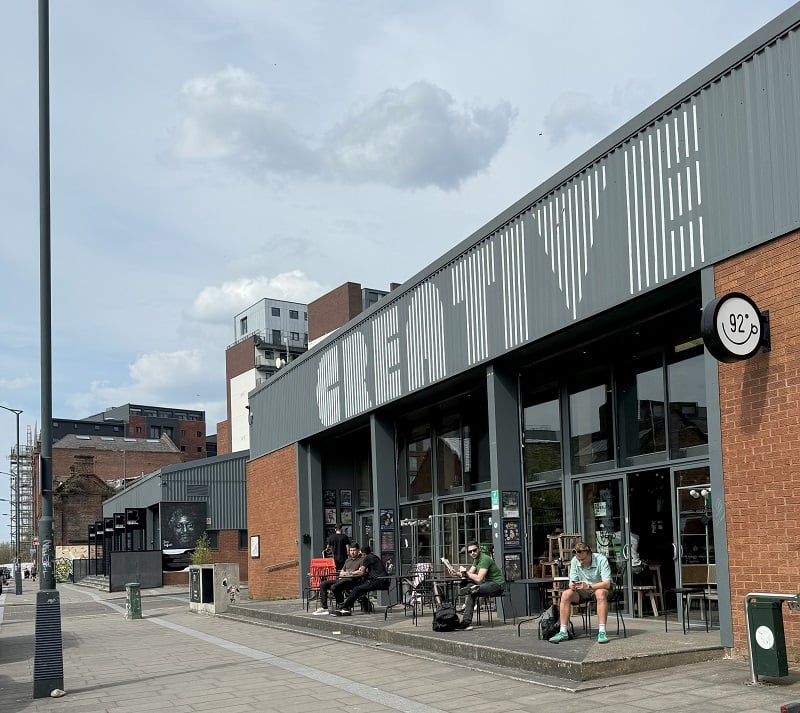
Baltic Triangle, Creative Campus
We returned to Lime Street and said our fond farewells, reflecting on the contrasting and diverse people and projects we had met over the past two days (before updating our statuses and sharing photos on LinkedIn). What an enjoyable way to step back from the day job to remind yourself why you fell in love with planning and remember why you’re proud to call the North West ‘home’!
Matt Dugdale
RTPI NW Chair 2024
[email protected]
Planning Aid North West in 2024
Throughout the North West, our work continues to be delivered by over 50 dedicated volunteers with a range of skills, interests, and expertise.
At the start of the year, we met with the Planning Aid England (PAE) South West Task Group to advise on how our region has successfully promoted services and volunteer opportunities. This included advice on finding volunteers, finding opportunities to help communities, and maintaining an active task group.
Our region has by far the greatest number of PAE volunteers in England. Surprisingly, our biggest issue is finding opportunities for our volunteers to help – whether that’s assisting local planning authorities with consultations, engaging communities interested in the planning process, project work on behalf of charity organisations, or delivering training.
Earlier this year, we supported PLACED as they undertook community engagement work as part of the Liverpool City Region Combined Authority (LCRCA) Spatial Development Strategy (SDS) consultation. The Strategy covers Liverpool, Halton, Knowsley, St Helens, Sefton, and Wirral. A series of drop-in workshops were set up throughout the six local authorities. PAE volunteers attended each event to provide on-hand expertise to members of the public and other interested stakeholders. The SDS is now progressing to the next stage, where the NW Task Group is hoping to assist further in engaging communities and encouraging members of the public to get involved.
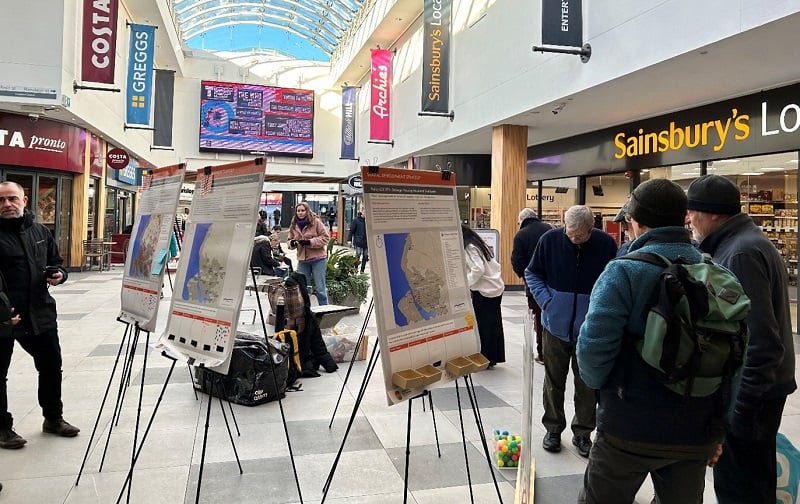
LCRCA Spatial Development Strategy Consultation Event at Liverpool Central Station
The PAE Task Group recently published the results of our annual development plan monitoring research. This is the seventh year that a team of PAE volunteers has compiled information on the level of neighbourhood plan support offered by authorities and the preparation progress of all neighbourhood and local plans in the region.
We have continued to see a decline in the number of new neighbourhood plans coming forward and some local authorities have paused Local Plan preparation. This is because of proposed changes to the National Planning Policy Framework and the Standard Method for calculating housing supply. However, Places for Everyone (the Spatial Development Strategy for Greater Manchester) progressed to adoption in March. PAE first engaged with consultation with community groups back in 2016 and continued to advise various stakeholders throughout the process. It was therefore positive to see it finally adopted!
PAE Task Group Chair, Darren Muir, was invited to join the RTPI presidential delegation on their tour of Liverpool during the summer, where Darren spoke about his involvement with Baltic Triangle Area Community Interest Company and how PAE has offered assistance to Liverpool City Council as they seek to bring out a raft of new supplementary planning documents.
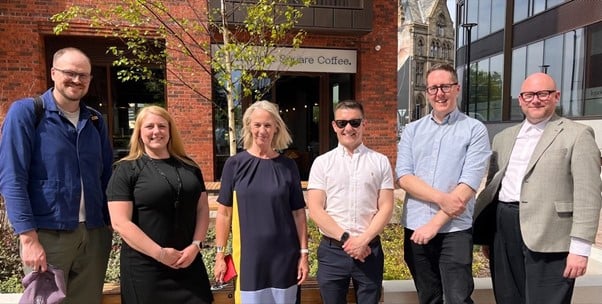
RTPI President's Tour of Liverpool
In October, we hosted a lunchtime webinar for planning aid volunteers and RTPI members, focused around Achieving Community Aims and Objectives via Neighbourhood Planning and Community Land Trusts. Speakers included Tom Chance – Chief Executive Community Land Trust Network, Mark Child – Chair of Oxfordshire Community Land Trust & Planning Lawyer, Ann Skippers – Ann Skippers Planning and was chaired by Eleanor Rawsthorne – PAE NW Task Group Member. The session was insightful to see how communities have firsthand achieved development in their local area and the session concluded with an interesting question around how the initiatives can contribute to the governments housing ambitions.
We are immensely proud and grateful to our volunteers and look forward to opportunities to share our skills and expertise, representing the planning profession in the region, in 2025.
If you want to be involved in supporting local people with planning issues, then why not become a Planning Aid volunteer? To do so you first need to register on the RTPI website.
If also you want to help organise Planning Aid activities in the Region by being part of the Task Group, then contact Bev Watson at [email protected]
EDI Champion Update
The end of 2024 welcomes a new Equity, Diversity and Inclusion (EDI) RTPI North West Action Group, who have been identifying and discussing exciting milestones and activities for the RTPI to involve themselves in.
The RTPI have begun to make strides in the right direction and has published an action plan, alongside fellow professional institutes (including Chartered Institute of Building (CIOB), Institution of Civil Engineers (ICE), Landscape Institute (LI), Royal Institute of British Architects (RIBA), Royal Institution of Chartered Surveyors (RICS)) which sets out in detail how we will deliver a more diverse, equitable and inclusive sector and ensuring it is more representative of the society it serves.
In the North West we have sought to support the RTPI and our wider profession in delivering change in those key areas of focus. Our Regional Activities Committee has EDI strongly on its agenda and aims to make improvements in everything it does.
The Action Group have embodied such objectives, discovering clear opportunities for the RTPI to deliver EDI focused initiatives within the North West. Such opportunities are then to be reflected as an active example on how the RTPI can have a larger influence in creating more accessible, representative and equitable resources and places.
Through idea sharing and detailed planning, the Action Group seek to deliver an LGBTQI* Heritage Tour within Manchester City Centre, celebrating the built environment and social history of this changing environment. This tour aligns with the ambitions of Manchester City Council’s Gay Village Action Plan, in creating a heritage tour with supporting signage to guide and educate visitors. As part of this tour, local businesses will be welcomed to talk about their interpretations of the changing environment, the inclusivity of these spaces and how this could be improved. In our profession, this is a significant opportunity for us to advise our own approach in how spaces can be designed in the ‘public interest’.
The fragility of LGBTQI* scenes is at a crucial stage in our post-pandemic climate for cities across the UK, where they can vanish from the space, being no longer safe or visible in the city. Public Consultation in terms of Local Plan preparation, designations and applications are therefore increasingly crucial to engage with diverse communities and in effect represent them in a manner which protects and enhances Queer Spaces, therefore maintaining the cultural and social heritage they possess in our cities. We therefore encourage you to keep an eye out for the advertisement of the event and attend to learn more about diverse communities and planning.
In addition, our Planning Ambassadors (many of whom are already working with Young Planners and our education team) have been integral in delivering the RTPIs EXPLORE programme which works with our school contacts to provide work experience across our sector to local secondary school and regional university students.
This programme has allowed us to reach out to members of the committee who are currently underrepresented in our progression and to increase their awareness and representation within the profession, showing career paths and opportunities with employers.
As a regional body we have also made great strides in how promote EDI in our training and continued professional development (CPD). We have made consistent improvement in the diversity of our speakers and hosts at CPD events as well as reviewing our practices in terms of ensuring our venues and events are inclusive for all of our members.
We are also excited for members of our Action Group to host CPD event centric around incorporating EDI into the planning practice and the role of Equality Impact Assessments (EIAs) in maintaining sustainability. As discussed with the Young Planners Committee, this will be centred around Sophie Stanton’s EDI Assessment reporting model, inviting other Young Planners, BAME Planners Network (BPN) committee member Ransford Stewart and co-founder of Make Space for Girls Susannah Walker to share and discuss their experiences and recommendations for the profession.
The Action Group continues to grow with its ambitions, and we welcome anybody who would like to get involved as a member in the organisation of our EDI initiatives.
LPA Champions
LPA Engage is a newly established task group in 2024 formed of several planning officers from across the North West. We have come together to continue exploring new ways to provide support to planners working in the public sector across the region. The group has explored some fantastic and very exciting ways we can roll out our mission across 2025. Here is a snapshot of some of the things we have in store:
- Planning Performance Agreement & Pre-application advice Training: led by Jade Corcoran (Salford City Council), the task group is collaborating with the Planning Advisory Service (PAS) to explore whether a training programme can be devised and employed to assist local planning authorities (LPAs) with achieving full cost recovery for discretionary services (i.e. providing pre-application advice and entering into Planning Performance Agreements (PPAs)). An initial programme would be aimed at the Greater Manchester LPAs, which can potentially be rolled out to other areas if there is interest. At the moment, the format of the programme is being discussed and tested by task group members. The final draft format may be sent to those LPAs who have expressed an interest in the programme for comment, subject to the level of commitment required from them. Once a consensus is reached on whether the programme is likely to be well received, a decision will taken on whether to deliver the training at the beginning of next year (2025).
- LPA CPD and Design Sessions: the LPA Engage task group is supporting the CPD task group in the delivery of three LPA focused CPD sessions and three design focused CPD sessions in 2025. The three CPD sessions are likely to focus on enforcement, heritage and viability. The design CPD sessions are likely to focus on planning policy, development management and how to consider the benefits and impacts of design with both planners and non-planners.
- Social Events: We are seeking to work with LPAs to deliver networking events for their staff. These events will include an element of CPD, such as a tour around notable regeneration projects or other site visit, followed by networking with refreshments. We are currently exploring this with two LPAs in the north west and are keen to facilitate such events, so get in touch if you want us to assist your LPA.
- Heads of Planning Forum: We are currently exploring hosting a forum for Heads of Planning / Chief Planners across the region. This will focus on the resourcing and budgeting challenges each LPA is facing amongst other things.
- Sharing of Job Specifications: The task group is considering the drafting of an example job specification for local authority planning roles based on a number of existing examples across the region. This is proposed to be shared to assist LPAs in the region when recruiting for new roles.
- RTPI North West Apprenticeships: We are continuing to explore how an RTPI Apprenticeship course can be delivered in the North West. Currently this is not available, and any apprentices need to travel to Sheffield or Birmingham to study which has limited opportunities to create apprenticeship roles across the region. We are working with the RTPI accreditation team and academic institutions across the North West to explore this. If your organisation is interested in taking on an apprentice, please get in touch.
With a ground breaking year ahead of us as we look to deliver a host of completely new events and material for members, there is huge opportunity for planning departments across the region to utilise this support. The group would welcome your engagement and support in establishing itself as a platform in the region. Get in touch to discuss how you can be part of the year ahead!
North West Young Planners 2024
2024 has been another productive year for the NWYP network, building on last year by recruiting new members to the regional committee, expanding our activities, and bringing new event ideas to life. As our most visible activity, the member events stand out, and these are underpinned by dedicated and proactive behind-the-scenes work, including collaboration with various other RTPI volunteers and task groups such as education and careers events, professional groups across the industry, and other organisations.
One such behind-the-scenes activity this year was the members survey, led by NWYP committee member George Bissett, who compiled a set of questions to help us gauge how best to shape our events and any other activities going forward. Many thanks to all the network members who engaged with the survey by sharing your views.
Our events calendar started on 12 February by building on our relationship with one of the region’s universities, as former NWYP committee member Emily Bates teamed up with the University of Liverpool Planning Society to arrange an innovative take on a careers fair. Employers from across the broad range of planning roles were invited to provide students with a flavour of their working life under the guise of Speed Networking. Its ‘speed dating’ format limited the 20+ students in attendance to brief introductions and Q&As with each employer, and the response from all involved was very positive.
On the social front, the sold-out Ping Pong Tournament on 21 March brought in the spring. Hosted by Young Planners and RAC committee member Sophie Stanton in collaboration with RICS, the event provided an entertaining evening of competition and networking at Twenty Twenty Two in Manchester for the 60+ people who joined.

Ping Pong tournament
Next up, I took a turn to host a couple of outings - first a walking tour, then a cycling tour. On 24 April, we were led on foot by Stockport Council’s Deputy Chief Executive Paul Richards and Town Centre Planning Manager Daniel Hewitt - with contributions from their planning and regen colleagues, and WSP Principal Infrastructure Planner Luke Jiggins - on a tour of the town centre’s new infrastructure such as the RTPI Award-winning Transport Interchange and Viaduct Park development, and the recently pedestrianised Old Town area. The CPD topics encompassed strategic frameworks, the complexities of hybrid planning applications, retail planning and reviving occupancy rates, and the importance of embracing arts and culture in placemaking. All in all, it justified the popularity, after registration spaces flew off the shelves within a couple of days.
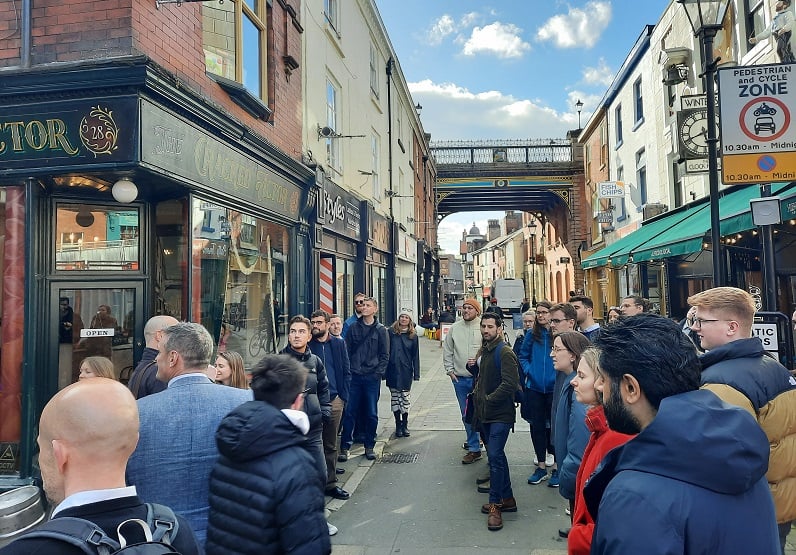
Stockport old town
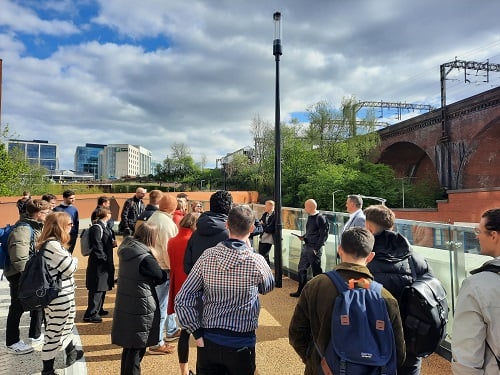
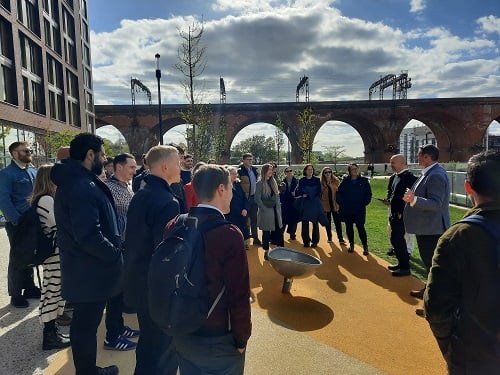
Stockport Interchange tour
On 1 May, we took the opportunity to observe bold and ambitious walking and cycling infrastructure ‘in the wild’ across Liverpool, as the University of Liverpool’s Dr Alex Nurse led attendees on a cycling ‘safari’ along a circular route from Lime Street Station. We saw a network beginning to take shape and benefited from the firsthand experience of how city-regions are approaching the need for fast change in travel behaviours by enabling active travel to meet the public health, climate, and urban design challenges of our time.
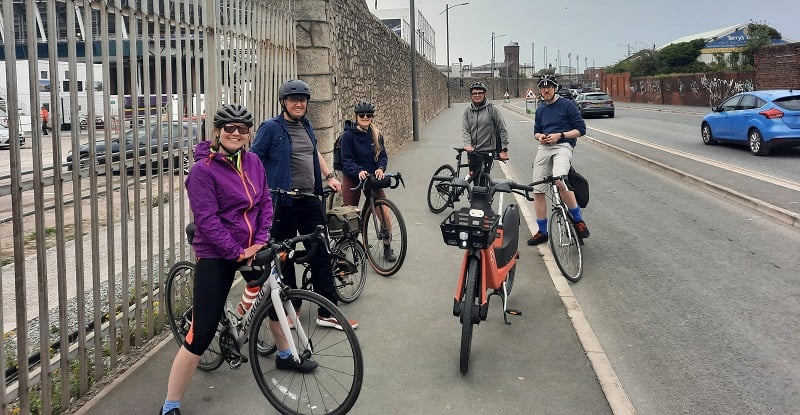
Cycling safari tour, Liverpool
The NWYP committee Vice Chair, Jemma Brabrook, in collaboration with networking group Forum for Tomorrow, then led another site visit - this time to the Aviva Studios / Factory International venue on 29 May. Attendees were treated to a behind-the-scenes tour of the venue’s flexible and unique spaces by their in-house guides, and insights on the planning process by Deloitte’s team who secured the consent.
By 5 June, the good word about Speed Networking had spread to the University of Manchester, who were keen to replicate the event format, and erstwhile NWYP committee member Ben Teague took the lead on doing so - with an even better response. We’ll certainly aim to continue with these in the future.
After a summer break, attendees of the Urban Sketching Workshop and Walking Tour on 4 September were treated to optimal weather conditions for an outdoor stroll around Manchester. The session began at Cathedral Gardens with organiser and NWYP committee member George Bissett’s introduction to sketching as a tool for planners, along with a practical demonstration. The group then walked to the Northern Quarter, using the model of Gordon Cullen’s Serial Vision to capture the changing perspectives, visual experience and drama of the route - and attracting only a handful of confused looks from passers-by - before finishing with some street sections. We hope to run a similar session next year, so watch this space.
This year’s seminar and workshop aimed at supporting planners with their chartership ambitions again proved popular. NWYP committee member Josh Parkinson organised an event at WSP’s Manchester office and invited APC Assessor Joanne Harding to deliver a presentation and interactive tasks. Attendees responded with some great questions to seize the opportunity of the in-person setting. As ever, best of luck to all who are preparing their submission.
We returned to the WSP Manchester office for a seminar and workshop replicating an event format that my team had run internally during the summer. Jaimee Boutcher-Hann set the scene with a presentation on the Safety Inclusion Assessment process that the WSP Transport Planning team have refined to enable gender-sensitive design through projects. It provoked discussion around public engagement, implementing design standards, and how to measure and record perceived fear of crime. Greater Manchester Moving then took the lead, as Eve Holt spoke about their Right to the Streets initiative. Eve spoke about their of research in North Trafford and its positive outcomes, including a range of community-led ideas and actions, and the educational card deck that formed the basis of the workshop that attendees then undertook. For more on this event, read the RTPI blog here.
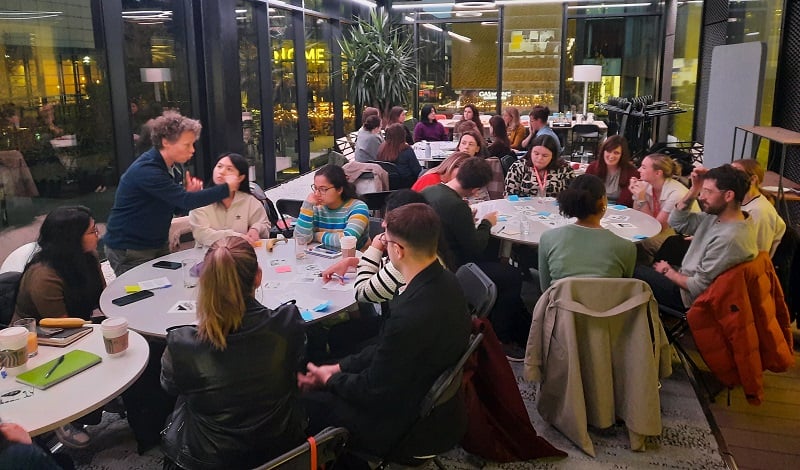
Right to Streets workshop
At the time of writing, tickets for the (pre-)Winter Social at Flight Club in Manchester have sold out, and by the time you’ve read this we’ll have seen out the NWYP events year in style with novelty darts games and a buffet. Many thanks to NWYP committee member Alistair Peet for arranging it.
On the horizon, we have some events pencilled in for next year, including another social in collaboration with RICS in February, an electricity network themed seminar in collaboration with National Grid, and I’m particularly looking forward to a seminar early in 2025 (date TBC) centred around Sophie Stanton’s EDI Assessment reporting model and furthering the EDI agenda in the region. This will be an opportunity to work with the BAME Planners Network (BPN) as BPN committee member Ransford Stewart is among those lined up to attend and present. Alongside this, we’re working to improve representation in the North West planning profession via the growth of the region’s BPN. NWYP committee member Rhiannan Farrell is leading on this - if you’d also like to be involved, please send an email to Bev Watson, who will pass it on.
Finally, I’d like to wish you all a vision-led approach to 2025.
Regional Research and Good Practice
The achievements of North West Planners on influencing policy and implementing good practice
Policy and Research Task Group Report for 2024
Planning policy has been at the forefront of national attention during 2024, most directly following the July general election which has thrown housing delivery in particular into the spotlight. The Labour government emphasised the need for urgent planning reform, a priority which was highlighted in the Chancellor, Rachel Reeves’ inaugural speech. In late July, the government consulted on proposed changes to the National Planning Policy Framework and housing number methodologies, with plans to respond by the end of the year.
A roundtable consultation on these proposed NPPF changes was held in August to understand regional members’ views on the proposed amendments. The feedback from the roundtable discussion fed into the RTPI’s central policy committee’s formal consultation response. The Policy and Research Task Group have been working this year on a new strategy for the organisation of roundtable events moving forward, in order to ensure that our responses are representative of our varied regional membership.
Future changes to national planning policy are proposed, including National Development Management Policies and digital reforms in plan-making. The government aims to implement a new plan-making system as set out in the Levelling-up and Regeneration Act by summer or autumn 2025, which is expected to increase the number of plans progressing towards adoption in the North West.
Regionally, history was made in March this year as nine local authorities adopted the Greater Manchester Places for Everyone strategy, a joint development plan outlining policies and site allocations for the city region. Blackburn with Darwen and Warrington also adopted new local plans earlier this year, while the Copeland Local Plan was found sound in September. Pendle published its Local Plan in November, but overall, it has been a quiet year for plans moving through the later stages of the plan-making process.
During 2024, the Policy and Research Task Group have been working to cultivate a collaborative relationship connecting the North West region with the central RTPI Policy team more closely. The ambition is for our region to maximise the number of forthcoming policy reviews, consultations and research calls that we can support our central team with, thereby amplifying the voice of our regional members. This continuing association will make it possible to arrange “targeted” roundtable events and earlier engagement with local members, organisations and higher education institutions, on any policy and research matters which may impact on current practice and teaching.
Three Higher Education providers in the region - the Universities of Manchester, Liverpool and Salford - continue to support and promote the RTPI and planning profession, as a viable future career choice, through actively participating in outreach activities, collaborative engagement with the professional body and responding positively to any calls for research activity. The programme curriculums have a strong focus on the promotion of ethical values and in ensuring that Government policies and any other proposed changes to the current planning system, such as the recent NPPF consultation are clearly communicated to academics and learners.
Providers have been proactively engaging and participating in focus groups with the RTPI, as part of their Education Policy Review, to ensure that current provision remains “fit for purpose”. An associated report will be issued to the Trustees in December 2024, and it is expected that we will see increased and expedited opportunities to modify existing or apply for future accreditations.
Our regional Policy and Research Task Group have played a crucial role in the awarding of the RTPI national Early Career Research Grant funding, the winners of which will be announced in December 2024. The judging panel provided essential expertise and diverse perspectives that contribute to the quality and relevance of the funded research. The panel consisted of academics, practitioners and policymakers from across the regions. The involvement of different sectors in this process helped to ensure that the RTPI’s research funding grants are awarded to projects that are not only methodologically sound but are also aligned with current challenges and priorities experienced by public and private sector practitioners. Furthermore, this collaborative approach to grant review also creates networking and knowledge-sharing opportunities, as experts from different sectors and disciplines come together, strengthening the connections between academia, practice, and policy – as a task group we hope to continue to provide representation through similar projects in future years.
The RTPI NW bulletin would welcome short articles on our activities. Please contact Bev Watson if you require further information about the newsletter.
Guest Academic Article:
Cycling and the city region: policy ambitions and the realities of delivery in Greater Manchester
Thomas van Laake, doctoral researcher at the University of Manchester
Transformative change takes time. Nearly seven years on from the launch of the agenda-setting ‘Made to Move’ strategy, which set out Greater Manchester’s target of becoming ‘the very first city region [with] a fully joined up cycling and walking network’, the practical and political difficulties of ensuring a cycling-inclusive future for the city region are coming into focus.
Despite the ambitious targets put in place, travel surveys reveal that cycling mode share has stagnated at 2 percent,[1] far below the 10 percent target for 2025 set by the Greater Manchester Cycling Strategy (in 2014). Meanwhile, infrastructure delivery has been hamstrung by political opposition to reductions in parking spaces and removing space for motor vehicles. Unlike many global peers, the city region failed to make the most of the historic opportunity to promote cycling during the Covid-19 pandemic.
Granted, there have been national political headwinds ranging from bizarre conspiracy theories around Low Traffic Neighbourhoods (LTNs) and 15-minute cities to the Conservatives’ electioneering ‘war on the motorist’ rhetoric. Nonetheless, the devolution experiment that has enabled Greater Manchester’s cycling network vision held out the promise of transformative governance at the metropolitan scale, and warrants evaluating on its own terms. The considerable gap between city region policy targets and the realities of delivery in austerity-hit local authorities begs the question of whether current governance arrangements are working as intended.
With these dilemmas in mind, this article positions Greater Manchester (henceforth GM) as a model case of how pro-cycling reforms play out across heterogeneous agglomerations, i.e. a city region made up of various towns and cities with individual characteristics. I argue that while devolution has enabled the launch of an ambitious cycling policy, the coordination of delivery at the city region scale foregrounds tensions between common visions and their implementation in differently situated contexts. As a new national government refocuses investment in active travel and Andy Burnham launches his third mayoral term, policymakers and advocates across GM and the wider UK could learn important lessons from the development and trajectory of the city region’s cycling policy.
A cycling model for a model city region
Cycling infrastructure is not a new phenomenon in the valley of the Mersey. Ample segregated, cycle tracks built in the pre-war era continue to grace roads across Trafford (see Figure 1). Alas, as cycling regained relevance to transport planners in the latter decades of the 20th century, local authorities tended to deliver low quality facilities and did not make progress towards a coherent network at the council, let alone city region scale.
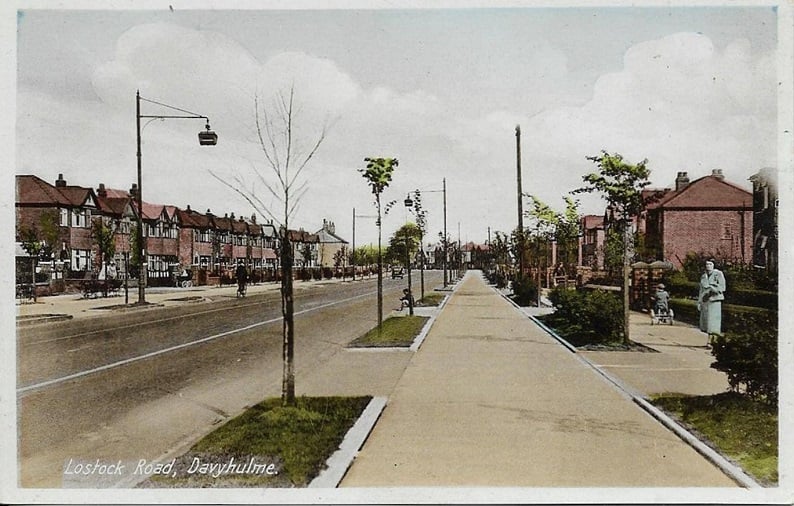
Lostock Road, in the contemporary borough of Trafford. From Carlton Reid’s research on
historical cycle infrastructure: https://www.britishcycletracks.com/
The evident futility of this amateurish and occasionally ‘mad’ approach to cycling provision has long been recognised by decision makers. A breakthrough for the quality and impact of interventions arrived in Manchester’s selection for a Cycle City Ambition Grant (awarded 2013), which helped deliver the Oxford Road-Wilmslow Road corridor as part of the wider Velocity 2025 plan. These efforts saw planners learn from and reference cases of international ‘best practice’ ranging from upcoming Berlin and the well-established Netherlands.[2]
Devolution has only strengthened the aspiration for ‘world class’ infrastructure. However, the Bee Network vision has seen Transport for Greater Manchester (TfGM) develop its own model of pro-cycling intervention, one explicitly suited to the city region’s strengths and challenges. Certainly, this approach has drawn heavily on London’s experience, hiring former TfL cycling expert Brian Deegan during the initial years of the Bee Network’s development. However, the city region now boasts its own street reconfiguration standards (Streets for All) and policy partnerships for delivering specific targets such as Vision Zero (Safer Roads partnership) and access to cycling (GM Moving).
Indeed, GM’s position in policy learning hierarchies may be reversing. As England’s leading site of devolution, the city region has been positioned as an example on areas from spatial planning to social policy. Decision makers have consciously leaned into this role; for instance, the city region’s cycling plan was titled ‘Change a region to change a nation’, with Burnham explicitly stating his aim of developing “a model that can be replicated across the rest of the country."[3] Deegan and his boss Chris Boardman, the city-region’s first active travel commissioner, have moved on to determine national policy at Active Travel England (ATE) as, respectively, director of inspections and commissioner, taking lessons from their time at GM with them. Meanwhile, the CYCLOPS intersection configuration developed by TfGM engineers and tested on GM streets is being replicated by local authorities across the UK, including leading ‘cycling cities’ such as Cambridge.
Nonetheless, rather than presenting a policy package ready to copy and paste, GM might best be understood as a model in a different sense – as a ‘test case’ of how to deliver a transition to cycling at the metropolitan scale, working across a heterogeneous set of atypical contexts far removed from inner London or, indeed, Cambridge. As James Meek has suggested in his incisive account of the city’s housing crisis, the city region might productively be understood as a ‘scale model’ of the wider nation, not least given the evident geographical parallels: “Like England, Greater Manchester has its richer south, [..] its great main city of hedonism and cranes and sky-high rents, and its decapitalised, struggling northern towns.”[4] In this sense, the city region replicates, in miniature, the challenge faced by policymakers at higher levels of government: the delivery of a coherent pro-cycling policy across geographical differences.
A heterogeneous city region
In expanding programs of infrastructural reconfiguration across a heterogeneous city region like GM, planners and policymakers face a ‘chicken or egg’ problem: should infrastructure be prioritised in areas with the highest current or potential demand, or rather be deployed to grow demand in areas without high levels of cycling? In previous decades, plans for high-quality cycling infrastructure had focused on connections within and to central zones. For instance, the ‘Vélocity 2025’ plan (funded by the CCAG grant) envisioned a centripetal network of routes to facilitate commuter travel into central Manchester. The contemporary prioritisation of higher-demand corridors such as the Chorlton Cycleway and the city-centre cycle hire scheme demonstrate that this planning logic, which both responds to and accentuates the already divergent conditions for cycling across the city region, continues to inform decision making.

The Velocity 'Hub and Spoke' plan
However, the coordination of cycling policy at the city region scale has considerably expanded the scope of cycling interventions and thereby changed logics of infrastructure provision. TfGM has sought to develop high-impact cycling projects in all constituent local authorities, following the combined authority’s (GMCA) consensus-based political calculus that distributes funds and support fairly across the city region. All constituent councils have signed up to the common infrastructure vision and, in return, have seen some level of investment with initial plans aiming to develop a cycling corridor, CYCLOPS intersection, and Active Neighbourhood (LTN) in each local authority. Notwithstanding these distributive intentions, however, the realities of delivery have evidenced that this common program of infrastructural reconfiguration lands unevenly across the city region.
While devolution holds out the promise of coordinated, coherent policy across the city region, it has not dissolved the ten constituent councils. Significant differences in institutional capacity and political support for cycling between local authorities have strongly influenced how the GM network vision plays out. While central boroughs such as Manchester and Salford can deploy a considerable planning apparatus to deliver projects and develop locally adapted plans, many outlying boroughs are hamstrung by staff shortages and a lack of cycling-specific expertise. Moreover, the common policy spans a heterogeneous region marked by disparate mobility situations and divergent processes of urbanisation and socio-economic development, which heavily mediate the potential for transformative change. Cycling interventions align particularly well with the redevelopment and intensification of city centres, which tends to increase density, provides opportunities to completely redesign infrastructure, and delivers funds to do so through section 106 contributions. On the other hand, the smaller towns and suburban developments on the outer reaches of the agglomeration are much less amenable to pro-cycling policy. Tellingly, the growing Walk Ride GM campaign boasts 13 local groups in Manchester, while Bury and Tameside feature only one group, and Wigan has none. Though advocates have recognised the need to push the campaign into different spaces, demographic and cultural differences across the city region make this a challenging proposition.
Differences and boundaries
The uneven implementation of GM’s cycling policies illustrates how transport transitions are mediated by spatial differences. To some, these divergent outcomes foreground the need to adapt policy and design approaches to suit local conditions, rather than attempt to replicate ‘what works’ in the urban core. Certainly, advocates and planners working in areas such as North Manchester and GM’s outer boroughs are often aware of their particular problems and opportunities. For instance, Wigan Council has emphasised off-road routes, which suit the borough’s lower-density environment and respond to their greater concern with resident health (rather than city-centre congestion). Such considerations indicate that plans for the city-region wide expansion of the Starling bicycle hire system, currently operating in central areas of Manchester, Trafford, and Salford, are not likely to represent good value for money. Instead, in most of the agglomeration, access to cycling might be best improved by bike libraries and cycle training targeted to vulnerable communities.[5]
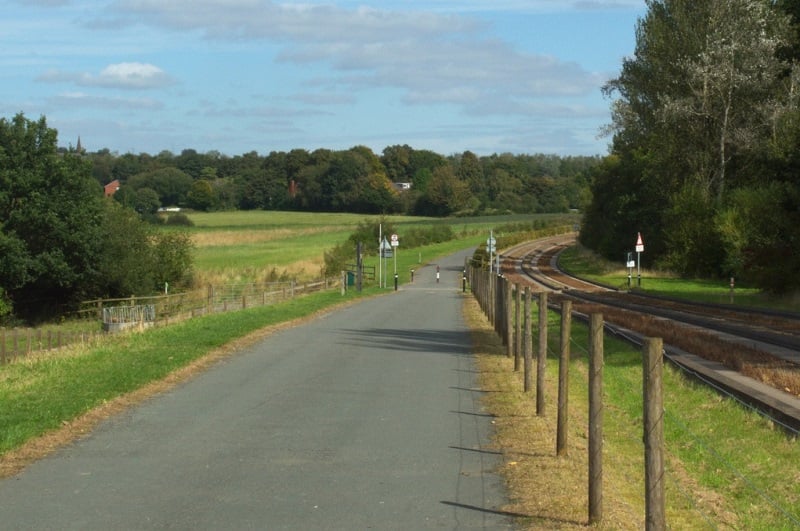
Multi-use trail alongside Leigh guided busway, Wigan. Photo by author.
However, the differentiation of cycling interventions across GM does not always represent a benefit. Under political pressure, councils have sought to lower the ambition of schemes; as in the case of Stockport’s preference for light-touch crossing improvements and back routes, with underwhelming proposals for the A6 proving particularly controversial among advocates. Here, TfGM’s design review panel (DRP) plays an important role in ensuring funds are well spent and departures from standard practice is justified strategically, rather than simply convenient politically. Nonetheless, TfGM’s lack of control over the main road network is a significant barrier to progress on a GM-wide cycling network.
As any cyclist passing from Salford’s red cycle tracks to Manchester’s green will attest, some differences are simply cosmetic. However, the Irwell also marks the boundary of the Lime e-scooter system, which has been unable to expand into Manchester proper due to the conditions of the national trial. Indeed, despite city region devolution, local authority boundaries continue to frustrate cross-jurisdictional policy coordination. Councils are often working in parallel on the same problem, as in the case of Automatic Number Plate Recognition cameras for School Streets, first approved in Oldham and now underway across the city-region. These inefficiencies are further compounded by the debilitating effect of austerity measures and the cumbersome grant funding system, both of which significantly limit councils’ ability to sustain policies over the time necessary for change to happen.
Lessons and take-aways
This article has emphasised the challenges TfGM’s cycling planners face in extending cycling policies and infrastructure projects across a heterogeneous urban area marked by significant inequality, divergent processes of (sub)urbanisation, and local governments atrophied by austerity. In addressing the legacies of uncoordinated and unambitious cycling improvements, the delivery of GM’s cycling vision has foregrounded the new problems and dynamics associated with devolution.
The rescaling of policy holds the potential for policy innovation as well as more effective coordination. In addition to GM’s cycling plans, the potential for devolved governments to enact ambitious action on transport was borne out by the Welsh Government’s 20mph speed limit policy. However, as this article has shown, the impacts of the rescaling of policy are complex, and relate to broader questions of political legitimacy, the relation of abstract expertise to local knowledge, expanding dynamics of urbanisation and interregional mobility, and so on. Accordingly, rather than a ‘prototype’ to replicate, GM’s city region scale governance of cycling might better be understood as a ‘scale model’ of the balance between shared goals and local implementation, and the associated trade-offs between standardisation and differentiation.
Looking Forward
 Well done, Reader! You’ve made it to the end of another turbulent year in planning. During 2024, we got a new Government, a new Secretary of State and (probably by the time you read this), a new NPPF too. Despite all this rapid change, the RTPI has remained a constant source of comfort and knowledge.
Well done, Reader! You’ve made it to the end of another turbulent year in planning. During 2024, we got a new Government, a new Secretary of State and (probably by the time you read this), a new NPPF too. Despite all this rapid change, the RTPI has remained a constant source of comfort and knowledge.
I’d like to congratulate our outgoing Chair; Matt Dugdale, on what he’s achieved this year. Under his leadership, we’ve delivered another year of excellent service for our members. My personal highlight this year, was seeing research regarding the benefits of Strategic Planning, part funded by RTPI NW, presented directly to Matt Pennycook MP at the Labour Party Conference. Naturally none of this would be possible without the experience and diligence of Bev Watson, who I look forward to working with closely with during 2025.
A little bit about me…
I’ve not always been a planner, spending the early years of my career in the charity sector. Charity sector workers are constantly encouraged to volunteer. This usually took the form of helping run an event. I have fond memories of loudly managing ‘cheer stations’ at London Marathons and meeting the late, great Sir Bob Hoskins. He called me a ‘prat’ because I’d forgotten to organise a parking space for him. Sorry, Sir Bob.
Whilst I didn’t pick up any ‘celebrity parking’ skills, volunteering taught me a raft of useful skills in event organising, accounting, networking, and sales/marketing, to name a few. I soon learnt that mentioning my volunteering helped me to stand out in job interviews.
Eventually, I got my Planning MA through distance learning. Unfortunately, it was 2009 and planners were being ‘crunched’. I wasn’t getting interviews. I knew how to get them though. I spent a week drifting around on planning enforcement boats as part of the Norfolk Broads Authority’s planning volunteer pilot. Then a few weeks more helping the TCPA with a couple of climate change projects. Interview invites started appearing.
Camden’s DM team eventually took me on. Whilst DM was a great experience, I’d always thought the truest form of planning is plan-making/policy and was keen to get into this area. This is where I first got involved with the RTPI, answering a call for Planning Aid volunteers to assist a Neighbourhood Forum. When that long-awaited interview to join Camden’s policy team eventually came – I was ready. My principal task there was to deliver ‘car free’ policies. Sorry again, Sir Bob.
With a local plan under my belt, I relocated to the North, writing policy for Cheshire East. Within the first couple of weeks at the Council, my chartership was approved. For anyone who has gone through APC – well done! I found it bloody hard. LPA planners (understandably) often ask what the point in it is. This was me. What could I do with my hard earned chartership status?
As a southerner, I didn’t know any planners in the North. However, my chartership enabled me access to the volunteering opportunities offered by RTPI Northwest. I went to a meeting and, before I knew it, I was Treasurer. Best of all, I’d built a fantastic network of fellow planners. It’s not easy relocating. The people I met through volunteering made that much easier for me. I went onto being elected as an RTPI Trustee during 2023.
My day job is leading South Ribble’s policy team. This means, I’m going to be the first LPA planner to chair RTPI NW since…forever! The systemic issues affecting LPAs are well known. I see them daily. Consequently during 2025, whilst ensuring that our great services are continued, I will prioritise:
- trying to make the lives of my fellow Officers throughout the Region a bit easier, by delivering events tailored for LPA planners (including design skills training and sessions aimed at career changers);
- using my position as an Officer to win back some LPAs who unfortunately may have drifted away from the RTPI; and
- forging a stronger link between RTPI NW and planners working for the Isle of Man Government.
RTPI NW always welcomes new volunteers. Volunteering has helped my career no end. I’ve always seen it as a safe space to try things out, to succeed or fail. Whilst Sir Bob was momentarily livid to find himself without parking, I think he understood the young man peering apologetically into his car window wasn’t an employee. I’d volunteered my free time, much like he had. We both agreed I wasn’t in the right job, but I wouldn’t have known that without giving it a go. Why not try it yourselves, Readers?
Benjamin Vickers
RTPI NW Chair 2025
[1] TfGM Travel Diary Surveys 2022, published April 2024
[2] Sheldrick, A., Evans, J., & Schliwa, G. (2017). Policy learning and sustainable urban transitions: Mobilising Berlin’s cycling renaissance. Urban Studies, 54 (12), 2739-2762.
[3] TfGM, 2020. Change a region to change a nation: Greater Manchester’s walking and cycling investment plan.
[4] James Meek, ‘Market Forces and Malpractice’, London Review of Books Vol. 46, No. 13, 4 July 2024. Available at: https://www.lrb.co.uk/the-paper/v46/n13/james-meek/market-forces-and-malpractice
[5] Thomas van Laake, ‘Micromobility and the city region’. Walk Ride GM blog, 1 July 2024. Available at: https://www.walkridegm.org.uk/2024/07/01/micromobility-and-the-city-region/